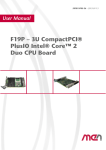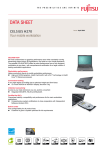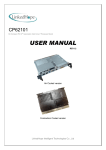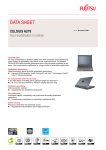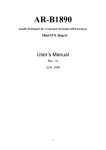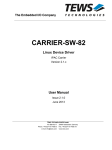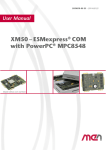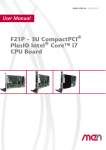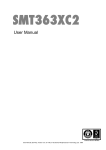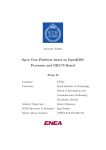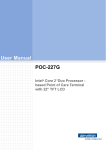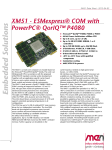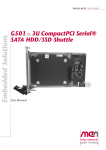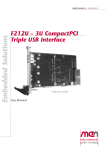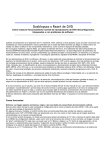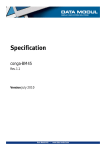Download MEN Mikro XM2 Manual
Transcript
20XM02-00 E3 – 2014-02-21
User Manual
XM2 - ESMexpress® COM
with Intel® Core™ 2 Duo
Module without cover and frame
Module inside cover and frame
XM2 - ESMexpress® COM with Intel® Core™ 2 Duo
XM2 - ESMexpress® COM with Intel® Core™ 2 Duo
The XM2 is a Computer-On-Module which together with an application-specific
carrier board forms a semi-custom solution for industrial, harsh, mobile and
mission-critical environments.
The XM2 is controlled by a Intel® Core™ 2 Duo CPU with a clock frequency of up
to 2.26 GHz and a total power consumption of up to 40W.
The XM2 can accommodate 4 GB of DDR3 DRAM memory and supports other
memory like USB Flash on the carrier board.
The GS45 graphics controller supports x16 PCI Express® Graphics or up to two
SDVO interfaces, or one LVDS port.
In addition, four x1 or one x4 PCI Express® links are supported by the XM2. Other
modern serial interfaces are 2 Gigabit Ethernet channels, 8 USB ports, 3 SATA
ports, and one HD audio port. These interfaces are all routed from the XM2 for
availability on any ESMexpress® carrier board.
The XM2 is completed by a board management controller for temperature and
power supervision. It comes with an InsydeH2O™ EFI BIOS configurable for the
final application.
The XM2 is screened for operation from 0°C to +85°C (Tcase). As all
ESMexpress® modules it is embedded in a covered frame. This ensures EMC
protection and allows efficient conductive cooling. Air cooling is also possible by
applying a heat sink on top of the cover. With a low power processor the module
may even be operated in an extended temperature range. ESMexpress® modules are
firmly screwed to a carrier board and come with rugged industry-proven connectors
supporting high frequency and differential signals. Only soldered components are
used to withstand shock and vibration, and the design is optimized for conformal
coating. All ESMexpress® modules support a single 95x125mm form factor.
For evaluation and development purposes an ATX carrier board is available. The
ESMexpress® module can be evaluated on a COM Express® carrier board via an
adapter from ESMexpress® to COM Express®.
MEN Mikro Elektronik GmbH
20XM02-00 E3 – 2014-02-21
2
Diagram
Diagram
B Onboard connector
Intel® Core™ 2 Duo
Processor
PCIe x16
ECC DDR3 SDRAM
SDVO (0)
SDVO (1)
LDVS
GS45 Memory Controller
Graphics Controller
J2
PCIe x1
8 USB 2.0
PCIe x1
SATA
ICH9M
I/O Controller
Gb Ethernet
HD Audio
SMB
PCIe x1
Gb Ethernet
Board Controller
SMB
ESMexpress® Connector
MEN Mikro Elektronik GmbH
20XM02-00 E3 – 2014-02-21
B
3
Technical Data
Technical Data
CPU
• Intel® Core™ 2 Duo SP9300
- Up to 2.26GHz processor core frequency
- 800/1066MHz system bus frequency
• Chipset
- Northbridge: Intel® GS45
- Southbridge: Intel® ICH9M-E
Memory
• Up to 6MB L2 cache integrated in Core 2 Duo
• Up to 4GB DDR3 SDRAM system memory
- Soldered
- 800/1067MHz memory bus frequency locked to the FSB frequency
Serial ATA (SATA)
• Three ports via ESMexpress® connector
• Transfer rates up to 3Gbit/s (SATA 3.0)
Graphics
•
•
•
•
•
•
Integrated in Intel® GS45 chipset
Maximum resolution: 2048 Þ 1536 pixels (QXGA)
One x16 link (PCI Express® graphics) or
Up to two SDVO ports
One LVDS port (4 bit, max. 1366x768)
Available via ESMexpress® connector
USB
•
•
•
•
Eight USB 2.0 host ports
UHCI implementation
Data rates up to 480Mbit/s
Available via ESMexpress® connector
Ethernet
•
•
•
•
Two 10/100/1000Base-T Ethernet channels
Ethernet controllers connected by two x1 PCIe® links
Two LED signals per channel for LAN link, activity status and connection speed
Available via ESMexpress® connector
PCI Express®
• Two x1 links to connect local 1000Base-T Ethernet controllers
• Four x1 links or one x4 link via ESMexpress® connector (switchable on the
carrier)
• Data rate 250MB/s in each direction (2.5 Gbit/s per lane)
MEN Mikro Elektronik GmbH
20XM02-00 E3 – 2014-02-21
4
Technical Data
GPIO
• 1 line from PIC via ESMexpress® connector
• Usable for LED
HD audio
• Via ESMexpress® connector
Board Management Controller
•
•
•
•
•
Input voltage supervision
Power sequencing
Board monitoring
Watchdog
Accessible via SMBus
Miscellaneous
• Real-time clock (with GoldCap or battery backup on the carrier board)
• SMBus interface
Electrical Specifications
• Supply voltage/power consumption:
- +12V (-25%/+33%), power consumption up to 40W
- +5V (-5%/+5%) standby voltage
Mechanical Specifications
• Dimensions: 95mm x 125mm
• ESMexpress® PCB mounted between a frame and a cover
• Weight: 230g (incl. cover and frame)
Environmental Specifications
• Temperature range (operation): 0..+85°C Tcase (ESMexpress® cover/frame)
(screened)
• Temperature range (storage): -40..+85°C
• Relative humidity (operation): max. 95% non-condensing
• Relative humidity (storage): max. 95% non-condensing
• Altitude: -300m to + 3,000m
• Shock: 15g/11ms (EN 60068-2-27)
• Bump: 10g/16ms (EN 60068-2-29)
• Vibration (sinusoidal): 1g/10..150Hz (EN 60068-2-6)
• Conformal coating on request
MTBF
• 154,077h @ 40°C according to IEC/TR 62380 (RDF 2000)
MEN Mikro Elektronik GmbH
20XM02-00 E3 – 2014-02-21
5
Technical Data
Safety
• PCB manufactured with a flammability rating of 94V-0 by UL recognized
manufacturers
EMC
• EMC behavior depends on the system and housing surrounding the
ESMexpress® module.
• MEN has performed general, successful EMC tests for ESMexpress® using the
XC1 evaluation carrier according to:
- EN 55022 (radio disturbance)
- IEC 61000-4-2 (ESD)
- IEC 61000-4-3 (electromagnetic field immunity)
- IEC 61000-4-4 (burst)
- IEC 61000-4-5 (surge)
- IEC 61000-4-6 (conducted disturbances)
BIOS
• InsydeH2O™ UEFI Framework
Software Support
• Windows® (Windows® XP, Windows® 7)
• Linux
- tested/verified with: Ubuntu 10.04 (kernel 2.6.32-21) 32-bit and 64-bit
versions
- OpenSuse 11.3 32-bit and 64-bit versions
- and: CentOS 5.5 (kernel 2.6.18) 32-bit and 64-bit versions
- Detailed matrix of supported interfaces under Ubuntu 10.04 and OpenSuse
11.3
• VxWorks® (in preparation)
• QNX®
• For more information on supported operating system versions and drivers see
online data sheet.
MEN Mikro Elektronik GmbH
20XM02-00 E3 – 2014-02-21
6
Configuration Options
Configuration Options
CPU
•
•
•
•
•
Intel® SP9300, 2.26GHz, 1066MHz FSB, 6MB cache, 25W
Intel® SL9400, 1.86GHz, 1066MHz FSB, 6MB cache, 17W
Intel® SU9300, 1.2GHz, 800MHz FSB, 3MB cache, 10W
Intel® Celeron® M722, 1.2GHz, 800MHz FSB, 1MB cache, 5.5W
Intel® Celeron® M723, 1.2GHz, 800MHz FSB, 1MB cache, 10W
Memory
• System RAM
- 1 GB, 2GB or 4GB
Please note that some of these options may only be available for large volumes.
Please ask our sales staff for more information.
For available standard configurations see online data sheet.
MEN Mikro Elektronik GmbH
20XM02-00 E3 – 2014-02-21
7
Product Safety
Product Safety
!
Electrostatic Discharge (ESD)
Computer boards and components contain electrostatic sensitive devices.
Electrostatic discharge (ESD) can damage components. To protect the board and
other components against damage from static electricity, you should follow some
precautions whenever you work on your computer.
• Power down and unplug your computer system when working on the inside.
• Hold components by the edges and try not to touch the IC chips, leads, or
circuitry.
• Use a grounded wrist strap before handling computer components.
• Place components on a grounded antistatic pad or on the bag that came with the
component whenever the components are separated from the system.
• Store the board only in its original ESD-protected packaging. Retain the original
packaging in case you need to return the board to MEN for repair.
MEN Mikro Elektronik GmbH
20XM02-00 E3 – 2014-02-21
8
About this Document
About this Document
This user manual is intended only for system developers and integrators, it is not
intended for end users.
It describes the hardware functions of the board, connection of peripheral devices
and integration into a system. It also provides additional information for special
applications and configurations of the board.
The manual does not include detailed information on individual components (data
sheets etc.). A list of literature is given in the appendix.
History
Issue
Date
E1
First issue
2009-09-30
E2
Update of BIOS description - Invalid! Changes
reversed in E3
2011-03-04
E3
Changed EMC information in Technical Data
Removed DisplayPort and HDMI references
Removed all ANSI-VITA 59 references
2014-02-21
MEN Mikro Elektronik GmbH
20XM02-00 E3 – 2014-02-21
Comments
9
About this Document
Conventions
This sign marks important notes or warnings concerning the use of voltages which
can lead to serious damage to your health and also cause damage or destruction of
the component.
!
italics
bold
monospace
This sign marks important notes or warnings concerning proper functionality of the
product described in this document. You should read them in any case.
Folder, file and function names are printed in italics.
Bold type is used for emphasis.
A monospaced font type is used for hexadecimal numbers, listings, C function
descriptions or wherever appropriate. Hexadecimal numbers are preceded by "0x".
comment
Comments embedded into coding examples are shown in green color.
hyperlink
Hyperlinks are printed in blue color.
The globe will show you where hyperlinks lead directly to the Internet, so you can
look for the latest information online.
IRQ#
/IRQ
Signal names followed by "#" or preceded by a slash ("/") indicate that this signal is
either active low or that it becomes active at a falling edge.
in/out
Signal directions in signal mnemonics tables generally refer to the corresponding
board or component, "in" meaning "to the board or component", "out" meaning
"coming from it".
Vertical lines on the outer margin signal technical changes to the previous issue of
the document.
MEN Mikro Elektronik GmbH
20XM02-00 E3 – 2014-02-21
10
About this Document
Legal Information
Changes
MEN Mikro Elektronik GmbH ("MEN") reserves the right to make changes without further notice to any products
herein.
Warranty, Guarantee, Liability
MEN makes no warranty, representation or guarantee of any kind regarding the suitability of its products for any
particular purpose, nor does MEN assume any liability arising out of the application or use of any product or
circuit, and specifically disclaims any and all liability, including, without limitation, consequential or incidental
damages. TO THE EXTENT APPLICABLE, SPECIFICALLY EXCLUDED ARE ANY IMPLIED
WARRANTIES ARISING BY OPERATION OF LAW, CUSTOM OR USAGE, INCLUDING WITHOUT
LIMITATION, THE IMPLIED WARRANTIES OF MERCHANTABILITY AND FITNESS FOR A
PARTICULAR PURPOSE OR USE. In no event shall MEN be liable for more than the contract price for the
products in question. If buyer does not notify MEN in writing within the foregoing warranty period, MEN shall
have no liability or obligation to buyer hereunder.
The publication is provided on the terms and understanding that:
1. MEN is not responsible for the results of any actions taken on the basis of information in the publication, nor
for any error in or omission from the publication; and
2. MEN is not engaged in rendering technical or other advice or services.
MEN expressly disclaims all and any liability and responsibility to any person, whether a reader of the publication
or not, in respect of anything, and of the consequences of anything, done or omitted to be done by any such person
in reliance, whether wholly or partially, on the whole or any part of the contents of the publication.
Conditions for Use, Field of Application
The correct function of MEN products in mission-critical and life-critical applications is limited to the
environmental specification given for each product in the technical user manual. The correct function of MEN
products under extended environmental conditions is limited to the individual requirement specification and
subsequent validation documents for each product for the applicable use case and has to be agreed upon in writing
by MEN and the customer. Should the customer purchase or use MEN products for any unintended or
unauthorized application, the customer shall indemnify and hold MEN and its officers, employees, subsidiaries,
affiliates, and distributors harmless against all claims, costs, damages, and expenses, and reasonable attorney fees
arising out of, directly or indirectly, any claim or personal injury or death associated with such unintended or
unauthorized use, even if such claim alleges that MEN was negligent regarding the design or manufacture of the
part. In no case is MEN liable for the correct function of the technical installation where MEN products are a part
of.
Trademarks
All products or services mentioned in this publication are identified by the trademarks, service marks, or product
names as designated by the companies which market those products. The trademarks and registered trademarks
are held by the companies producing them. Inquiries concerning such trademarks should be made directly to those
companies.
Conformity
MEN products are no ready-made products for end users. They are tested according to the standards given in the
Technical Data and thus enable you to achieve certification of the product according to the standards applicable in
your field of application.
MEN Mikro Elektronik GmbH
20XM02-00 E3 – 2014-02-21
11
About this Document
RoHS
Since July 1, 2006 all MEN standard products comply with RoHS legislation.
Since January 2005 the SMD and manual soldering processes at MEN have already been completely lead-free.
Between June 2004 and June 30, 2006 MEN’s selected component suppliers have changed delivery to RoHScompliant parts. During this period any change and status was traceable through the MEN ERP system and the
boards gradually became RoHS-compliant.
WEEE Application
The WEEE directive does not apply to fixed industrial plants and tools. The compliance is the responsibility of the
company which puts the product on the market, as defined in the directive; components and sub-assemblies are
not subject to product compliance.
In other words: Since MEN does not deliver ready-made products to end users, the WEEE directive is not
applicable for MEN. Users are nevertheless recommended to properly recycle all electronic boards which have
passed their life cycle.
Nevertheless, MEN is registered as a manufacturer in Germany. The registration number can be provided on
request.
Copyright © 2014 MEN Mikro Elektronik GmbH. All rights reserved.
Germany
MEN Mikro Elektronik GmbH
Neuwieder Straße 3-7
90411 Nuremberg
Phone +49-911-99 33 5-0
Fax +49-911-99 33 5-901
E-mail info@men.de
www.men.de
MEN Mikro Elektronik GmbH
20XM02-00 E3 – 2014-02-21
France
MEN Mikro Elektronik SAS
18, rue René Cassin
ZA de la Châtelaine
74240 Gaillard
Phone +33 (0) 450-955-312
Fax +33 (0) 450-955-211
E-mail info@men-france.fr
www.men-france.fr
USA
MEN Micro Inc.
860 Penllyn Blue Bell Pike
Blue Bell, PA 19422
Phone (215) 542-9575
Fax (215) 542-9577
E-mail sales@menmicro.com
www.menmicro.com
12
Contents
Contents
1 Getting Started . . . . . . . . . . . . . . . . . . . . . . . . . . . . . . . . . . . . . . . . . . . . . . . .
1.1 Map of the Board. . . . . . . . . . . . . . . . . . . . . . . . . . . . . . . . . . . . . . . . .
1.2 First Operation. . . . . . . . . . . . . . . . . . . . . . . . . . . . . . . . . . . . . . . . . . .
1.3 Installing Operating System Software. . . . . . . . . . . . . . . . . . . . . . . . .
1.3.1
Installing Windows 2000 via USB . . . . . . . . . . . . . . . . . . . .
1.4 Installing Driver Software . . . . . . . . . . . . . . . . . . . . . . . . . . . . . . . . . .
17
17
19
19
19
19
2 Functional Description . . . . . . . . . . . . . . . . . . . . . . . . . . . . . . . . . . . . . . . . . .
2.1 Power Supply. . . . . . . . . . . . . . . . . . . . . . . . . . . . . . . . . . . . . . . . . . . .
2.2 Board Supervision . . . . . . . . . . . . . . . . . . . . . . . . . . . . . . . . . . . . . . . .
2.3 Reset . . . . . . . . . . . . . . . . . . . . . . . . . . . . . . . . . . . . . . . . . . . . . . . . . .
2.4 Real-Time Clock . . . . . . . . . . . . . . . . . . . . . . . . . . . . . . . . . . . . . . . . .
2.5 Processor Core. . . . . . . . . . . . . . . . . . . . . . . . . . . . . . . . . . . . . . . . . . .
2.5.1
Thermal Considerations . . . . . . . . . . . . . . . . . . . . . . . . . . . .
2.6 Memory . . . . . . . . . . . . . . . . . . . . . . . . . . . . . . . . . . . . . . . . . . . . . . . .
2.6.1
DRAM System Memory . . . . . . . . . . . . . . . . . . . . . . . . . . . .
2.6.2
Boot Flash . . . . . . . . . . . . . . . . . . . . . . . . . . . . . . . . . . . . . . .
2.6.3
EEPROM. . . . . . . . . . . . . . . . . . . . . . . . . . . . . . . . . . . . . . . .
2.7 Mass Storage: Serial ATA (SATA) . . . . . . . . . . . . . . . . . . . . . . . . . . .
2.8 Graphics. . . . . . . . . . . . . . . . . . . . . . . . . . . . . . . . . . . . . . . . . . . . . . . .
2.9 USB Interface . . . . . . . . . . . . . . . . . . . . . . . . . . . . . . . . . . . . . . . . . . .
2.10 Ethernet Interface . . . . . . . . . . . . . . . . . . . . . . . . . . . . . . . . . . . . . . . .
2.10.1 Ethernet Status LEDs . . . . . . . . . . . . . . . . . . . . . . . . . . . . . .
2.11 Audio . . . . . . . . . . . . . . . . . . . . . . . . . . . . . . . . . . . . . . . . . . . . . . . . . .
2.12 Status LED. . . . . . . . . . . . . . . . . . . . . . . . . . . . . . . . . . . . . . . . . . . . . .
2.13 PCI Express Interface . . . . . . . . . . . . . . . . . . . . . . . . . . . . . . . . . . . . .
2.14 ESMexpress . . . . . . . . . . . . . . . . . . . . . . . . . . . . . . . . . . . . . . . . . . . . .
2.14.1 Mechanical Concept . . . . . . . . . . . . . . . . . . . . . . . . . . . . . . .
2.14.2 Thermal Concept. . . . . . . . . . . . . . . . . . . . . . . . . . . . . . . . . .
2.14.3 ESMexpress Connectors . . . . . . . . . . . . . . . . . . . . . . . . . . . .
2.14.4 Using an ESMexpress Module on a COM Express Carrier
Board . . . . . . . . . . . . . . . . . . . . . . . . . . . . . . . . . . . . . . . . . . .
20
20
20
20
21
21
21
21
21
22
22
22
22
23
23
23
24
24
25
26
26
26
28
MEN Mikro Elektronik GmbH
20XM02-00 E3 – 2014-02-21
38
13
Contents
3 BIOS . . . . . . . . . . . . . . . . . . . . . . . . . . . . . . . . . . . . . . . . . . . . . . . . . . . . . . . . .
3.1 Main. . . . . . . . . . . . . . . . . . . . . . . . . . . . . . . . . . . . . . . . . . . . . . . . . . .
3.2 Advanced . . . . . . . . . . . . . . . . . . . . . . . . . . . . . . . . . . . . . . . . . . . . . . .
3.3 Security . . . . . . . . . . . . . . . . . . . . . . . . . . . . . . . . . . . . . . . . . . . . . . . .
3.4 Power . . . . . . . . . . . . . . . . . . . . . . . . . . . . . . . . . . . . . . . . . . . . . . . . . .
3.5 Boot . . . . . . . . . . . . . . . . . . . . . . . . . . . . . . . . . . . . . . . . . . . . . . . . . . .
3.6 Exit . . . . . . . . . . . . . . . . . . . . . . . . . . . . . . . . . . . . . . . . . . . . . . . . . . .
3.6.1
Exit Saving Changes . . . . . . . . . . . . . . . . . . . . . . . . . . . . . . .
3.6.2
Save Change Without Exit . . . . . . . . . . . . . . . . . . . . . . . . . .
3.6.3
Exit Discarding Changes. . . . . . . . . . . . . . . . . . . . . . . . . . . .
3.6.4
Load Optimal Defaults . . . . . . . . . . . . . . . . . . . . . . . . . . . . .
3.6.5
Load Custom Defaults. . . . . . . . . . . . . . . . . . . . . . . . . . . . . .
3.6.6
Save Custom Defaults . . . . . . . . . . . . . . . . . . . . . . . . . . . . . .
3.6.7
Discard Changes . . . . . . . . . . . . . . . . . . . . . . . . . . . . . . . . . .
41
42
44
57
59
66
69
69
69
69
69
70
70
70
4 Organization of the Board . . . . . . . . . . . . . . . . . . . . . . . . . . . . . . . . . . . . . . .
4.1 Memory Mappings . . . . . . . . . . . . . . . . . . . . . . . . . . . . . . . . . . . . . . .
4.1.1
Processor View of the Memory Map. . . . . . . . . . . . . . . . . . .
4.1.2
I/O Memory Map . . . . . . . . . . . . . . . . . . . . . . . . . . . . . . . . .
4.2 PCI Devices . . . . . . . . . . . . . . . . . . . . . . . . . . . . . . . . . . . . . . . . . . . . .
4.3 SMBus Devices . . . . . . . . . . . . . . . . . . . . . . . . . . . . . . . . . . . . . . . . . .
4.4 Interrupt Mapping . . . . . . . . . . . . . . . . . . . . . . . . . . . . . . . . . . . . . . . .
71
71
71
72
75
76
76
5 Appendix . . . . . . . . . . . . . . . . . . . . . . . . . . . . . . . . . . . . . . . . . . . . . . . . . . . . .
5.1 Literature and Web Resources . . . . . . . . . . . . . . . . . . . . . . . . . . . . . . .
5.1.1
CPU . . . . . . . . . . . . . . . . . . . . . . . . . . . . . . . . . . . . . . . . . . . .
5.1.2
SATA . . . . . . . . . . . . . . . . . . . . . . . . . . . . . . . . . . . . . . . . . . .
5.1.3
USB . . . . . . . . . . . . . . . . . . . . . . . . . . . . . . . . . . . . . . . . . . . .
5.1.4
Ethernet . . . . . . . . . . . . . . . . . . . . . . . . . . . . . . . . . . . . . . . . .
5.1.5
HD Audio . . . . . . . . . . . . . . . . . . . . . . . . . . . . . . . . . . . . . . .
5.1.6
PCI Express. . . . . . . . . . . . . . . . . . . . . . . . . . . . . . . . . . . . . .
5.2 Finding out the Board’s Article Number, Revision and
Serial Number . . . . . . . . . . . . . . . . . . . . . . . . . . . . . . . . . . . . . . . . . . .
78
78
78
78
78
78
78
79
MEN Mikro Elektronik GmbH
20XM02-00 E3 – 2014-02-21
79
14
Figures
Figure 1. Map of the board – cover side . . . . . . . . . . . . . . . . . . . . . . . . . . . . . . .
Figure 2. Map of the board – connector side . . . . . . . . . . . . . . . . . . . . . . . . . . . .
Figure 3. ESMexpress thermal concept: cooling wings between frame and
cover . . . . . . . . . . . . . . . . . . . . . . . . . . . . . . . . . . . . . . . . . . . . . . . . . . .
Figure 4. AE12 COM Express adapter board – Map of the board. . . . . . . . . . . .
Figure 5. Labels giving the board’s article number, revision and
serial number . . . . . . . . . . . . . . . . . . . . . . . . . . . . . . . . . . . . . . . . . . . .
MEN Mikro Elektronik GmbH
20XM02-00 E3 – 2014-02-21
17
18
27
38
79
15
Tables
Table 1.
Table 2.
Table 3.
Table 4.
Table 5.
Table 6.
Table 7.
Table 8.
Table 9.
Table 10.
Table 11.
Table 12.
Table 13.
MEN Mikro Elektronik GmbH
20XM02-00 E3 – 2014-02-21
Processor core options on XM2 . . . . . . . . . . . . . . . . . . . . . . . . . . . . . .
Error codes signaled by board management controller via
LED flashes . . . . . . . . . . . . . . . . . . . . . . . . . . . . . . . . . . . . . . . . . . . . .
Pin assignment of ESMexpress connector J1, pins 61..120 . . . . . . . . .
Pin assignment of ESMexpress connector J1, pins 1..60 . . . . . . . . . . .
Pin assignment of ESMexpress connector J2, pins 91..120 . . . . . . . . .
Pin assignment of ESMexpress connector J2, pins 61..90 . . . . . . . . . .
Pin assignment of ESMexpress connector J2, pins 1..60 . . . . . . . . . . .
Signal mnemonics of 120-pin ESMexpress connectors . . . . . . . . . . . .
Memory map – processor view . . . . . . . . . . . . . . . . . . . . . . . . . . . . . .
Memory map - I/O . . . . . . . . . . . . . . . . . . . . . . . . . . . . . . . . . . . . . . . .
PCI Devices . . . . . . . . . . . . . . . . . . . . . . . . . . . . . . . . . . . . . . . . . . . . .
SMBus devices . . . . . . . . . . . . . . . . . . . . . . . . . . . . . . . . . . . . . . . . . . .
Interrupt Mapping. . . . . . . . . . . . . . . . . . . . . . . . . . . . . . . . . . . . . . . . .
21
24
29
30
31
32
33
34
71
72
75
76
76
16
Getting Started
1
Getting Started
This chapter gives an overview of the board and some hints for first installation in a
system.
1.1
Map of the Board
The following board map shows the board assembly from its cover side (top) and
connector side (bottom). The cover includes holes for mounting the ESMexpress
module onto a COM Express carrier.
Figure 1. Map of the board – cover side
J2
Top cover
ESMexpress connectors
(on bottom side)
1
J1
1
Screw holes to install ESMexpress module on a COM Express carrier
MEN Mikro Elektronik GmbH
20XM02-00 E3 – 2014-02-21
17
Getting Started
Figure 2. Map of the board – connector side
Cooling wing
Cooling wing
119
J2
61
59
119
J1
ESMexpress
connectors
Cooling wing
Cooling wing
1
Frame
61
59
1
Cooling wing
Cooling wing
Holes for mounting screws on carrier board
Screws connecting the frame and cover. Don’t remove!
MEN Mikro Elektronik GmbH
20XM02-00 E3 – 2014-02-21
18
Getting Started
1.2
First Operation
You can use the following check list when installing the board for the first time and
with minimum configuration using a Windows host PC.
Power-down the system.
Install the XM2 on your ESMexpress carrier board, making sure that the ESMexpress connectors are properly aligned.
To provide a better example, we assume that you are using MEN’s standard
evaluation carrier, XC1, which provides the necessary connections. You can find
more information on the XC1 in the XC1 User Manual, which is available for
download on MEN’s website.
Connect a USB keyboard and mouse to the USB connectors of the XC1.
Connect a flat-panel display to the DVI connector of the XC1.
Power-up the system.
You can start up the BIOS setup menu by hitting the <F2> key (see Chapter 3
BIOS on page 41).
Now you can make configurations in BIOS (see Chapter 3 BIOS on page 41).
Observe the installation instructions for the respective software.
1.3
Installing Operating System Software
The board supports Windows, Linux, VxWorks and QNX.
!
By standard, no operating system is installed on the board. Please refer to the
operating system installation documentation on how to install the software!
You can find any software available on MEN’s website.
1.3.1
Installing Windows 2000 via USB
If you want to install Windows 2000 using a USB CD-ROM drive, you must install
from a Windows 2000 CD including Service Pack 4 to avoid problems. This is a
known Windows problem.
1.4
Installing Driver Software
For a detailed description on how to install driver software please refer to the
respective documentation.
You can find any driver software available for download on MEN’s website.
MEN Mikro Elektronik GmbH
20XM02-00 E3 – 2014-02-21
19
Functional Description
2
Functional Description
The following describes the individual functions of the board and their
configuration on the board. There is no detailed description of the individual
controller chips and the CPU. They can be obtained from the data sheets or data
books of the semiconductor manufacturer concerned (Chapter 5.1 Literature and
Web Resources on page 78).
2.1
Power Supply
The XM2 board is supplied with +12V (9..16V) only.
The XM2 board can optionally be supplied with +5V (±5%) standby voltage. This
voltage can be used for the Wake-on-LAN functionality, for example.
All other required voltages are generated onboard.
2.2
Board Supervision
The XM2 provides an intelligent board management controller (BMC) with the
following main features:
•
•
•
•
•
•
•
Board power sequencing control
Voltage supervision
System watchdog
Software reset functionality
Error state logging
Power mode settings
SMBus communication with main CPU
The watchdog device monitors the board on operating system level. If enabled, the
watchdog must be triggered by application software. If the trigger is overdue, the
watchdog initiates a board reset and this way can put the system back into operation
when the software hangs.
The watchdog uses a configurable time interval or is disabled. Settings are made
through BIOS or via an MEN software driver.
In addition, the XM2 uses a National LM95245 device to measure the CPU die
temperature and the local board temperature.
MEN provides dedicated software drivers for the board controller and LM95245
device. For a detailed description of the functionality of the driver software please
refer to the drivers’ documentation.
You can find any driver software and documentation available for download on
MEN’s website.
2.3
Reset
The XM2 generates its own reset signal. You can wake it up from reset state by
externally switching the power supply off and on.
MEN Mikro Elektronik GmbH
20XM02-00 E3 – 2014-02-21
20
Functional Description
2.4
Real-Time Clock
The supply voltage for the RTC should be buffered with an external Goldcap or
battery device mounted on the carrier board.
2.5
Processor Core
The XM2 can be equipped with different types of Intel Core 2 Duo or Celeron
processors. The following table gives a performance overview:
Table 1. Processor core options on XM2
Processor Type
Core Frequency
Power Class
L2 Cache Front Side Bus
Intel Core 2 Duo
SP9300
2.26 GHz
25 W
6 MB
1066 MHz
Intel Core 2 Duo
SL9400
1.86 GHz
17W
6 MB
1066 MHz
Intel Core 2 Duo
SU9300
1.2 GHz
10 W
3 MB
800 MHz
Intel Celeron
M722
1.2GHz
5.5 W
1 MB
800 MHz
Intel Celeron
M723
1.2 GHz
10 W
1 MB
800 MHz
2.5.1
Thermal Considerations
The XM2 has a power dissipation of up to 40W.
The ESMexpress module is enclosed inside a cover and frame and therefore
provides a flexible thermal interface that can be used as needed to fulfill the thermal
needs of the application. Typically you should use it for conduction cooling or
convection cooling. It depends on the system configuration and airflow if an
additional heat sink is needed or not. In any case you should check your thermal
conditions and implement appropriate cooling.
See also Chapter 2.14.2 Thermal Concept on page 25.
!
Please note that if you do not use the cover and frame supplied by MEN and/or no
heat sink, warranty on functionality and reliability of the XM2 may cease. If you
have any questions or problems regarding thermal behavior, please contact MEN.
2.6
Memory
2.6.1
DRAM System Memory
The board provides up to 4 GB on-board, soldered DDR3 SDRAM. The memory
bus is 2x64 bits wide (dual channel) and operates with up to 1067 MHz.
The XM2 supports memory down technology. The memory is not realized with
complete modules. Instead single memory chips with a maximum of 2 Gbit per chip
are used.
MEN Mikro Elektronik GmbH
20XM02-00 E3 – 2014-02-21
21
Functional Description
2.6.2
Boot Flash
The XM2 has an 16-Mbit SPI Flash implemented as on-board Flash for BIOS data.
2.6.3
EEPROM
The board has a 2-kbit serial EEPROM for factory data.
2.7
Mass Storage: Serial ATA (SATA)
The ICH I/O Controller Hub of the XM2 provides three serial ATA channels which
are led to the ESMexpress connector.
The SATA interface supports transfer rates up to 3 Gbits/s and RAID 0 or RAID 1
functionality.
You can find the pinout for the SATA signals in Table 3, Pin assignment of
ESMexpress connector J1, pins 61..120 on page 29.
2.8
Graphics
The graphics core of the XM2 is part of the GMCH.
It supports a resolution of up to 2048x1536 pixels.
It provides one PCI Express® graphics x16 link, up to two SDVO ports, or one
LVDS port.
You can find the pinout for the graphics signals in Table 3, Pin assignment of
ESMexpress connector J1, pins 61..120 on page 29 and in Table 5, Pin assignment
of ESMexpress connector J2, pins 91..120 on page 31.
MEN Mikro Elektronik GmbH
20XM02-00 E3 – 2014-02-21
22
Functional Description
2.9
USB Interface
The XM2 provides eight USB 2.0 interfaces at the ESMexpress connector.
They are controlled by four UHCI controllers for USB 1.1 and two EHCI controllers
for USB 2.0 in the ICH9M I/O controller.
You can find the pinout for the USB signals in Table 3, Pin assignment of
ESMexpress connector J1, pins 61..120 on page 29.
2.10
Ethernet Interface
The XM2 provides two Gigabit Ethernet interfaces at the ESMexpress connector.
The Ethernet controllers are connected to the ICH9M I/O controller via two PCI
Express x1 links.
The interfaces are controlled by two Intel 82574L Ethernet controllers. They
support 10 Mbits/s up to 1000 Mbits/s as well as full-duplex operation,
autonegotiation and Wake-on-LAN functionality.
The controllers have their own EEPROM to store the MAC address etc. The
Ethernet transformers have to be mounted on the carrier board.
You can find the pinout for the Ethernet signals in Table 4, Pin assignment of
ESMexpress connector J1, pins 1..60 on page 30.
!
The unique MAC address is set at the factory and should not be changed. Any
attempt to change this address may create node or bus contention and thereby render
the board inoperable. The MAC addresses on XM2 are:
• LAN1:
• LAN2:
0x 00 C0 3A 9C Ex xx
0x 00 C0 3A 9D Fx xx
where "00 C0 3A" is the MEN vendor code, "9C" and "9D" are the MEN product
codes. The last four digits depend on the interface and the serial number of the
product. The serial number is added to the offset, for example for LAN1:
• Serial number 0042: 0x xx xx = 0xE000 + 0x002A = 0x E0 2A.
(See Chapter 5.2 Finding out the Board’s Article Number, Revision and Serial
Number on page 79.)
2.10.1
Ethernet Status LEDs
The XM2 provides two status LEDs for each Ethernet channel. They signal the link
and activity and can be led to the carrier board via the ESMexpress connectors.
See Table 4, Pin assignment of ESMexpress connector J1, pins 1..60 on page 30.
MEN Mikro Elektronik GmbH
20XM02-00 E3 – 2014-02-21
23
Functional Description
2.11
Audio
The XM2 supports a high definition audio interface on the ESMexpress connector.
The ICH9M I/O controller, however, only includes the controller. If you want to use
audio you have to implement an external codec on a carrier board.
You can find the pinout for the audio signals in Table 4, Pin assignment of
ESMexpress connector J1, pins 1..60 on page 30.
2.12
Status LED
The XM2 provides one GPIO pin driven by the board controller for a board status
LED. The line cannot be used as input.
The LED can be made available on the carrier board. It is switched on when the
BIOS starts, switched off when the board is switched off and flashing when the
board is in stand-by (S3) status.
During normal operation the LED can be switched on and off via the MEN driver
for the board controller. See MEN’s website for further information.
In case of a board failure, the LED displays the following error messages:
Table 2. Error codes signaled by board management controller via LED flashes
Number
of
Flashes
Error
Description
1
XM02BCI_ERR_33A
External 3.3 V failure
2
XM02BCI_ERR_INP
Input voltage failure
3
XM02BCI_ERR_NO_EXT_PWR_OK
External power supply failure
4
XM02BCI_ERR_ICH_HANDSHAKE
Chipset handshake failure
5
XM02BCI_ERR_NO_DDRVR_PWRGD
Memory voltage failure
6
XM02BCI_ERR_NO_PWRGD_5130
1.05 V or internal 3.3 V voltage failure
7
XM02BCI_ERR_NO_IMVP_PWRGD
CPU voltage failure
8
XM02BCI_ERR_NO_GFX_PWRGD
Graphic voltage failure
9
XM02BCI_ERR_PLT_RST_TIMEOUT
Platform reset timeout
10
XM02BCI_ERR_CPU_RST_TIMEOUT
CPU Reset timeout
11
XM02BCI_ERR_BIOS_TIMEOUT
BIOS timeout
12
XM02BCI_ERR_CPU_TOO_HOT
CPU too hot
255
CPUBCI_INVALID_MAIN_STATE
Invalid PIC main state
You can find the GPIO/LED pin in Table 4, Pin assignment of ESMexpress
connector J1, pins 1..60 on page 30.
MEN Mikro Elektronik GmbH
20XM02-00 E3 – 2014-02-21
24
Functional Description
2.13
PCI Express Interface
The ICH9M I/O controller provides up to six PCI Express x1 links. Each link
supports 2.5GB/s bandwidth in each direction.
Four x1 or one x4 ports can be accessed on the ESMexpress connector, the other two
are used for the Ethernet interfaces.
The GS45 graphics controller provides an additional PCIe x16 graphics root port
(PEG). This root port supports up to 40GB/s bandwidth in each direction. See
Chapter 2.8 Graphics on page 22.
You can find the pinout for the PCI Express signals on the ESMexpress connector in
Table 3, Pin assignment of ESMexpress connector J1, pins 61..120 on page 29,
Table 5, Pin assignment of ESMexpress connector J2, pins 91..120 on page 31,
Table 6, Pin assignment of ESMexpress connector J2, pins 61..90 on page 32 and
Table 7, Pin assignment of ESMexpress connector J2, pins 1..60 on page 33.
MEN Mikro Elektronik GmbH
20XM02-00 E3 – 2014-02-21
25
Functional Description
2.14
ESMexpress
ESMexpress is a Computer-On-Module (COM/SOM) standard that is especially
ruggedized and provides a high-performance, low-power architecture for harsh
environments.
The ESMexpress concept has been developed for applications that require highly
robust electronics to ensure safe and reliable operation even in severe environments,
e.g., in railways and avionics, industrial automation and medical engineering or
mobile applications in general.
Together with an application-specific carrier board, it forms a semi-custom solution
for industrial, harsh, mobile and mission-critical environments.
2.14.1
Mechanical Concept
ESMexpress modules are embedded in a frame and a cover, and are firmly screwed
to a carrier board. The frame and the cover ensure 100% EMC protection. Only
soldered components are used to withstand shock and vibration, and the design is
optimized for conformal coating. All ESMexpress modules support a single
95 x 125 mm form factor.
2.14.2
Thermal Concept
ESMexpress modules are equipped with eight cooling wings for conductive cooling.
The heat generated on the board is transported to the frame and the cover via the
cooling wings. The frame and the cover, however, are only part of the thermal
solution for a module. They only provide a common interface between the
ESMexpress module and implementation-specific thermal solutions.
The module can e.g. be cooled via conductive cooling, where the heat is transported
to a housing or a heat sink built on top of the cover. Where operating temperatures
are moderate, the module may even do without the frame and cover, with a suitable
low-power processor and airflow.
MEN Mikro Elektronik GmbH
20XM02-00 E3 – 2014-02-21
26
Functional Description
Figure 3. ESMexpress thermal concept: cooling wings between frame and cover
Cooling wing
Cooling wing
119
J2
61
59
119
J1
ESMexpress
connectors
Cooling wing
Cooling wing
1
Frame
61
59
1
Cooling wing
Cooling wing
Holes for mounting screws on carrier board
Screws connecting the frame and cover. Don’t remove!
Please contact MEN’s sales team for further information.
MEN Mikro Elektronik GmbH
20XM02-00 E3 – 2014-02-21
27
Functional Description
2.14.3
ESMexpress Connectors
The XM2 is connected to the carrier board via two 120-pin connectors.
Connector types:
• 2-row, 120-pin high-speed receptacle, 0.5mm pitch, e.g. Samtec QSH-060-01-L-D-A-K
• Mating connector:
2-row, 120-pin high-speed plug connector, 0.5mm pitch
!
Note: In the following pinout tables the ESMexpress connectors are shown as if seen through the cover side
and PCB, i.e. the pin layout (position of pin 1) will
be the same on a carrier board.
Cf. Figure 1, Map of the board – cover side (page 17)
and Figure 2, Map of the board – connector side
(page 18).
J2
ESMexpress connectors
(on bottom side)
1
J1
1
rier
MEN Mikro Elektronik GmbH
20XM02-00 E3 – 2014-02-21
28
Functional Description
Table 3. Pin assignment of ESMexpress connector J1, pins 61..120
119
61
62
59
60
MEN Mikro Elektronik GmbH
20XM02-00 E3 – 2014-02-21
120
119
PCIE_A0_TX+
120
PCIE_A0_RX+
117
PCIE_A0_TX-
118
PCIE_A0_RX-
115
GND
116
GND
113
PCIE_CLK_A0_REF+
114
LVDS_CLK+
111
PCIE_CLK_A0_REF-
112
LVDS_CLK-
109
GND
110
GND
107
LVDS0+
108
LVDS1+
105
LVDS0-
106
LVDS1-
103
LVDS2+
104
LVDS3+
101
LVDS2-
102
LVDS3-
99
L_DDC_CLK
100
L_DDC_DATA
97
GND
98
GND
95
SATA0_TX+
96
SATA0_RX+
93
SATA0_TX-
94
SATA0_RX-
91
GND
92
GND
89
SATA1_TX+
90
SATA1_RX+
87
SATA1_TX-
88
SATA1_RX-
85
GND
86
GND
83
SATA2_TX+
84
SATA2_RX+
81
SATA2_TX-
82
SATA2_RX-
79
GND
80
GND
77
USB0+
78
USB1+
75
USB0-
76
USB1-
73
USB_OC_0_1#
74
USB_OC_2_3#
71
USB2+
72
USB3+
69
USB2-
70
USB3-
67
GND
68
GND
65
USB4+
66
USB5+
63
USB4-
64
USB5-
61
USB_OC_4_5#
62
USB_OC_6_7#
GND
29
Functional Description
Table 4. Pin assignment of ESMexpress connector J1, pins 1..60
61
62
59
60
1
MEN Mikro Elektronik GmbH
20XM02-00 E3 – 2014-02-21
2
59
USB6+
60
USB7+
57
USB6-
58
USB7-
55
Vbatt
56
+5VSB
53
PWR_OK
54
PS_ON#
51
SMB_DATA
52
RESET_IN#
49
SMB_CLK
50
RESET_OUT#
47
SMB_ALERT#
48
WAKE#
45
GPIO/LED
46
PWRBTN#
43
HDA_IO
44
-
41
HDA_SYNC
42
-
39
HDA_BIT_CLK
40
HDA_SDIN
37
HDA_RST#
38
HDA_SDOUT
35
-
36
-
33
-
34
-
31
-
32
-
29
-
30
-
27
-
28
-
25
-
26
GND
23
ETH_B_LED_LINK#
24
ETH_B_LED_ACT#
21
ETH_B0+
22
ETH_B1+
19
ETH_B0-
20
ETH_B1-
17
ETH_B2+
18
ETH_B3+
15
ETH_B2-
16
ETH_B3-
13
ETH_B_REF
14
GND
11
ETH_A_LED_LINK#
12
ETH_A_LED_ACT#
9
ETH_A0+
10
ETH_A1+
7
ETH_A0-
8
ETH_A1-
5
ETH_A2+
6
ETH_A3+
3
ETH_A2-
4
ETH_A3-
1
ETH_A_REF
2
GND
+12V
30
Functional Description
Table 5. Pin assignment of ESMexpress connector J2, pins 91..120
119
PCIE_B0_TX+/
SDVOB_RED+
120
PCIE_B0_RX+/
SDVO_TVCLKIN+
117
PCIE_B0_TX-/
SDVOB_RED-
118
PCIE_B0_RX-/SDVO_TVCLKIN-
115
GND
116
GND
113
PCIE_B1_TX+/
SDVOB_GREEN+
114
PCIE_B1_RX+/
SDVOB_INT+
111
PCIE_B1_TX-/
SDVOB_GREEN-
112
PCIE_B1_RX-/
SDVOB_INT-
109
GND
110
GND
107
PCIE_B2_TX+/
SDVOB_BLUE+
108
PCIE_B2_RX+/SDVO_FLDSTALL+
105
PCIE_B2_TX-/
SDVOB_BLUE-
106
PCIE_B2_RX-/SDVO_FLDSTALL-
120
GND
61
62
103
GND
104
GND
59
60
101
PCIE_B3_TX+/
SDVOB_CLK+
102
PCIE_B3_RX+
99
PCIE_B3_TX-/SDVOB_CLK-
100
PCIE_B3_RX-
97
GND
98
GND
95
PCIE4_TX+/
SDVOC_RED+
96
PCIE_B4_RX+
93
PCIE4_TX-/
SDVOC_RED-
94
PCIE_B4_RX-
91
GND
92
GND
MEN Mikro Elektronik GmbH
20XM02-00 E3 – 2014-02-21
119
31
Functional Description
Table 6. Pin assignment of ESMexpress connector J2, pins 61..90
119
PCIE_B5_TX+/
SDVOC_GREEN+
90
PCIE_B5_RX+/
SDVOC_INT+
87
PCIE_B5_TX-/
SDVOC_GREEN-
88
PCIE_B5_RX-/
SDVOC_INT-
85
GND
86
GND
83
PCIE_B6_TX+/
SDVOC_BLUE+
84
PCIE_B6_RX+
81
PCIE_B6_TX-/
SDVOC_BLUE-
82
PCIE_B6_RX-
79
GND
80
GND
77
PCIE_B7_TX+/
SDVOC_CLK+
120
GND 78
PCIE_B7_RX+
61
62
75
PCIE_B7_TX-/SDVOC_CLK-
76
PCIE_B7_RX-
59
60
73
GND
74
GND
71
PCIE_B8_TX+
72
PCIE_B8_RX+
69
PCIE_B8_TX-
70
PCIE_B8_RX-
67
GND
68
GND
65
PCIE_B9_TX+
66
PCIE_B9_RX+
63
PCIE_B9_TX-
64
PCIE_B9_RX-
61
DDPC_CTRLDATA
62
DDPC_CTRLCLK
MEN Mikro Elektronik GmbH
20XM02-00 E3 – 2014-02-21
89
32
Functional Description
Table 7. Pin assignment of ESMexpress connector J2, pins 1..60
61
62
59
60
1
MEN Mikro Elektronik GmbH
20XM02-00 E3 – 2014-02-21
2
59
SDVO_CTRLDATA
60
SDVO_CTRLCLK
57
PCIE_B10_TX+
58
PCIE_B10_RX+
55
PCIE_B10_TX-
56
PCIE_B10_RX-
53
GND
54
GND
51
PCIE_B11_TX+
52
PCIE_B11_RX+
49
PCIE_B11_TX-
50
PCIE_B11_RX-
47
GND
48
GND
45
PCIE_B12_TX+
46
PCIE_B12_RX+
43
PCIE_B12_TX-
44
PCIE_B12_RX-
41
GND
42
GND
39
PCIE_B13_TX+
40
PCIE_B13_RX+
37
PCIE_B13_TX-
38
PCIE_B13_RX-
35
GND
36
GND
33
PCIE_B14_TX+
34
PCIE_B14_RX+
31
PCIE_B14_TX-
32
PCIE_B14_RX-
29
GND
30
GND
27
PCIE_B15_TX+
28
PCIE_B15_RX+
25
PCIE_B15_TX-
26
PCIE_B15_RX-
23
GND
21
PCIE_CLK_A1_REF+
22
PCIE_CLK_B_REF+
19
PCIE_CLK_A1_REF-
20
PCIE_CLK_B_REF-
17 CLK_REQ_CLK_A1_REF#
18
GND
15
PCIE_A3_TX+
16
PCIE_A3_RX+
13
PCIE_A3_TX-
14
PCIE_A3_RX-
11
GND
12
GND
9
PCIE_A2_TX+
10
PCIE_A2_RX+
7
PCIE_A2_TX-
8
PCIE_A2_RX-
5
GND
6
GND
3
PCIE_A1_TX+
4
PCIE_A1_RX+
1
PCIE_A1_TX-
2
PCIE_A1_RX-
GND
24 CLK_REQ_CLK_B_REF#
33
Functional Description
Table 8. Signal mnemonics of 120-pin ESMexpress connectors
Signal
Power
Direction
+5VSB
GND
5V standby voltage
-
Vbatt
Power
Management
Ground
3V battery voltage
PCIE_WAKE#
in
Wake signal from PCIe device to wake
XM2 from sleep state
PS_ON#
out
Enable signal for external power supply
PWRBTN#
in
Power button
PWR_OK
in
Power OK signal from external power supply
RESET_IN#
in
Reset signal from carrier board
RESET_OUT#
out
Reset signal from CPU board
out
Reference clock A0 100 MHz
CLK_REQ_CLK_A0_REF#
in
100 MHz clock request signal A0
PCIE_CLK_A1_REF+,
PCIE_CLK_A1_REF-
out
Reference clock A1 100 MHz
CLK_REQ_CLK_A1_REF#
in
100 MHz clock request signal A1
PCI Express PCIE_CLK_A0_REF+,
PCIE_CLK_A0_REF-
PCIe-based
Graphics
Interface
Signals
Function
PCIE_CLK_B_REF+, PCIE_- out
CLK_B_REF-
Reference clock B 100 MHz
CLK_REQ_CLK_B_REF#
100 MHz clock request signal B
in
PCIE_A0_RX+, PCIE_A0_RX- in
Differential PCIe receive lines, lane 0
PCIE_A0_TX+, PCIE_A0_TX- out
Differential PCIe transmit lines, lane 0
PCIE_A1_RX+, PCIE_A1_RX- in
Differential PCIe receive lines, lane 1
PCIE_A1_TX+, PCIE_A1_TX- out
Differential PCIe transmit lines, lane 1
PCIE_A2_RX+, PCIE_A2_RX- in
Differential PCIe receive lines, lane 2
PCIE_A2_TX+, PCIE_A2_TX- out
Differential PCIe transmit lines, lane 2
PCIE_A3_RX+, PCIE_A3_RX- in
Differential PCIe receive lines, lane 3
PCIE_A3_TX+, PCIE_A3_TX- out
Differential PCIe transmit lines, lane 3
PCIE_B[15:0]_RX+,
PCIE_B[15:0]_RX-
in
PCI Express Graphics Receive Differential Pair or regular PCIe 1x16 or 2x8.
SDVO and PCI Express Interface for
Graphics architecture are muxed together
PCIE_B[15:0]_TX+,
PCIE_B[15:0]_TX-
out
PCI Express Graphics Transmit Differential Pair or regular PCIe 1x16 or 2x8
MEN Mikro Elektronik GmbH
20XM02-00 E3 – 2014-02-21
34
Functional Description
Signal
LVDS
SATA
USB
HD Audio
Direction
Function
L_DDC_CLK
in/out
EDID support for flat-panel display
L_DDC_DATA
in/out
EDID support for flat-panel display
LVDS_CLK+, LVDS_CLK-
out
LVDS differential clock output
LVDS0-, LVDS0+
out
Differential LVDS lines, port 0
LVDS1-, LVDS1+
out
Differential LVDS lines, port 1
LVDS2-, LVDS2+
out
Differential LVDS lines, port 2
LVDS3-, LVDS3+
out
Differential LVDS lines, port 3
SATA0_RX+, SATA0_RX-
in
Differential SATA receive lines, port 0
SATA0_TX+, SATA0_TX-
out
Differential SATA transmit lines, port 0
SATA1_RX+, SATA1_RX-
in
Differential SATA receive lines, port 1
SATA1_TX+, SATA1_TX-
out
Differential SATA transmit lines, port 1
SATA2_RX+, SATA2_RX-
in
Differential SATA receive lines, port 2
SATA2_TX+, SATA2_TX-
out
Differential SATA transmit lines, port 2
USB0+, USB0-
in/out
Differential USB lines, port 0
USB1+, USB1-
in/out
Differential USB lines, port 1
USB2+, USB2-
in/out
Differential USB lines, port 2
USB3+, USB3-
in/out
Differential USB lines, port 3
USB4+, USB4-
in/out
Differential USB lines, port 4
USB5+, USB5-
in/out
Differential USB lines, port 5
USB6+, USB6-
in/out
Differential USB lines, port 6
USB7+, USB7-
in/out
Differential USB lines, port 7
USB_OC_0_1#
in
USB overcurrent, ports 0 and 1
USB_OC_2_3#
in
USB overcurrent, ports 2 and 3
USB_OC_4_5#
in
USB overcurrent, ports 4 and 5
USB_OC_6_7#
in
USB overcurrent, ports 6 and 7
HDA_IO
-
Reference voltage for external HDA codec
I/O voltage level
HDA_BIT_CLK
out
HD audio serial data clock
HDA_RST#
out
HD audio reset
HDA_SDIN
in
HD audio serial data in
HDA_SDOUT
out
HD audio serial data out
HDA_SYNC
out
HD audio synchronization
MEN Mikro Elektronik GmbH
20XM02-00 E3 – 2014-02-21
35
Functional Description
Signal
Ethernet
Direction
Function
ETH_A_LED_ACT#
out
Signal for activity status LED, port A
ETH_A_LED_LINK#
out
Signal for link status LED, port A
ETH_A0+, ETH_A0-
in/out
Media Dependent Interface [0] data, differential pair, port A
ETH_A1+, ETH_A1-
in/out
Media Dependent Interface [1] data, differential pair, port A
ETH_A2+, ETH_A2-
in/out
Media Dependent Interface [2] data, differential pair, port A
ETH_A3+, ETH_A3-
in/out
Media Dependent Interface [3] data, differential pair, port A
ETH_A_REF
out
Port A reference voltage
ETH_B_LED_ACT#
out
Signal for activity status LED, port B
ETH_B_LED_LINK#
out
Signal for link status LED, port B
ETH_B0+, ETH_B0-
in/out
Media Dependent Interface [0] data, differential pair, port B
ETH_B1+, ETH_B1-
in/out
Media Dependent Interface [1] data, differential pair, port B
ETH_B2+, ETH_B2-
in/out
Media Dependent Interface [2] data, differential pair, port B
ETH_B3+, ETH_B3-
in/out
Media Dependent Interface [3] data, differential pair, port B
ETH_B_REF
out
Port B reference voltage
MEN Mikro Elektronik GmbH
20XM02-00 E3 – 2014-02-21
36
Functional Description
Signal
Serial Digital Video
Output
(SDVO)
GMBus
Direction
Function
SDVOB_BLUE+,
SDVOB_BLUE-
out
Serial digital video B blue data, differential
pair
SDVOB_GREEN+,
SDVOB_GREEN-
out
Serial digital video B green data, differential pair
SDVOB_RED+,
SDVOB_RED-
out
Serial digital video B red data, differential
pair
SDVOB_CLK+, SDVOB_CLK-
out
Serial digital video B clock, differential pair
SDVOB_INT+, SDVOB_INT-
in
Serial digital video B input interrupt, differential pair
SDVOC_BLUE+,
SDVOC_BLUE-
out
Serial digital video B blue data, differential
pair
SDVOC_GREEN+,
SDVOC_GREEN-
out
Serial digital video B green data, differential pair
SDVOC_RED+,
SDVOC_RED-
out
Serial digital video B red data, differential
pair
SDVOC_CLK+, SDVOC_CLK-
out
Serial digital video B clock, differential pair
SDVOC_INT+, SDVOC_INT-
in
Serial digital video B input interrupt, differential pair
SDVO_FLDSTALL+, SDVO_FLDSTALL-
in
Serial digital video field stall, differential
pair
SDVO_TVCLKIN+, SDVO_TVCLKIN-
in
Serial digital video TVOUT synchronization clock, differential pair
SDVOCTRL_CLK
in/out
I²C based control signal (clock) for SDVO
device
SDVOCTRL_DATA
in/out
I²C based control signal (data) for SDVO
device
SDVO_CTRLCLK
in/out
I2C-based control signal (clock) for
DisplayPort device
SDVO_CTRLDATA
in/out
I2C-based control signal (data) for DisplayPort device
DDPC_CTRLCLK
in/out
I2C-based control signal (clock) for SDVO
device
DDPC _CTRLDATA
in/out
I2C-based control signal (data) for SDVO
device
Other
SMB_ALERT#
in
SMBus alert
SMB_CLK
in/out
SMBus clock
SMB_DATA
in/out
SMBus data
GPIO/LED
in/out
GPIO line for board status LED
MEN Mikro Elektronik GmbH
20XM02-00 E3 – 2014-02-21
37
Functional Description
2.14.4
Using an ESMexpress Module on a COM Express
Carrier Board
The AE12 adapter card offers the possibility to evaluate an ESMexpress module on
a COM Express carrier board. It complies with the COM Express Type 2 basic form
factor.
On its top side the AE12 has ESMexpress connectors for connecting the
ESMexpress module. On the bottom side the AE12 card is equipped with standard
COM Express connectors for plugging it onto the COM Express carrier.
Figure 4. AE12 COM Express adapter board – Map of the board
ESMexpress Connectors
COM Express Connectors (on bottom side of board)
The pin assignment of the COM Express connectors is compliant to the COM
Express standard.
The pin assignment of the ESMexpress connectors is compliant to the ESMexpress
standard.
MEN Mikro Elektronik GmbH
20XM02-00 E3 – 2014-02-21
38
Functional Description
Installing the ESMexpress Module on a COM Express Carrier
Align the ESMexpress connectors and the mounting holes of the adapter and
the module and plug the AE12 adapter firmly onto the ESMexpress module.
Install the ESMexpress module on the adapter using the following mounting
holes and the seven M2x4 cross-recess pan-head screws included in the delivery of the adapter:
ESMexpress Connectors
(on top side of board)
COM Express Connectors MEN Mikro Elektronik GmbH
20XM02-00 E3 – 2014-02-21
39
Functional Description
Turn the module around and insert five 2.5x18 cross-recess countersink-head
screws (also included in the delivery) into the five COM Express mounting
holes on the top of the ESMexpress module.
J2
Top cover
ESMexpress connectors
(on bottom side)
1
J1
1
Install the five 2.5x5 standoffs on the bottom of the adapter.
Plug the ESMexpress module/AE12 assembly onto the COM Express carrier
board.
Screw the adapter onto the COM Express carrier board using five M2.5x4
screws.
ESMexpress module
Standoff
AE12 adapter board
COM Express carrier
MEN Mikro Elektronik GmbH
20XM02-00 E3 – 2014-02-21
40
BIOS
3
BIOS
The XM2 is equipped with an InsydeH2O setup utility from Insyde Software.
InsydeH2O is Insyde Software's firmware product line designed to replace
traditional PC BIOS. It is an implementation of the Intel's Platform Innovation
Framework for UEFI /EFI. The UEFI/EFI specification defines a new model for the
interface between operating systems and platform firmware. This interface consists
of data tables that contain platform-related information, plus boot and runtime
service calls that are available to the operating system and its loader. Together, these
provide a standard environment for booting an operating system and running preboot applications. This product line is the next generation of PC BIOS technology.
The ">" character in front of a menu item means that a sub-menu is available. An
"x" in front of a menu item means that there is a configuration option which needs to
be activated through a higher configuration option before being accessible.
MEN Mikro Elektronik GmbH
20XM02-00 E3 – 2014-02-21
41
BIOS
3.1
Main
InsydeH2O Setup Utility
Main
Advanced
Security
Power
Rev. 3.5
Boot
Exit
InsydeH2O Version
XM2 BIOS V 1.xx
Processor Type
Intel Celeron M CPU 722 @ 1.20GHz
System Bus Speed
800MHz
System Memory Speed
800MHz
Cache RAM
1024kB
Total Memory
2048MB
SODIMM 0
1024MB
SODIMM 1
1024MB
Language
<English>
System Time
[hh:mm:ss]
System Date
[mm/dd/yyyy]
F1 Help
Select Item
F5/F6 Change Values
F9 Setup Defaults
Esc Exit
Select Menu
Enter Select > Submenu
F10 Save and Exit
InsydeH2O Version / MEN Board / Processor Type / System Bus Speed
/ System Memory Speed / Cache RAM/ Total Memory/ SODIMM 0 /
SODIMM 1
Description
You cannot change any values in these fields. They are only for
information.
Language
Description
Select the default language
Options
English
MEN Mikro Elektronik GmbH
20XM02-00 E3 – 2014-02-21
42
BIOS
System Time
Description
Change the internal clock.
Options
hh
Hours (Valid range from 0 to 23)
mm
Minutes (Valid range from 0 to 59)
ss
Seconds (Valid range from 0 to 59)
System Date
Description
Change the date
Options
mm
Month (Valid range from 1 to 12)
dd
Day (Valid range from 1 to 31)
yyyy
Year (Valid range from 2000 to 2099)
MEN Mikro Elektronik GmbH
20XM02-00 E3 – 2014-02-21
43
BIOS
3.2
Advanced
InsydeH2O Setup Utility
Main
Advanced
Security
Power
Rev. 3.5
Boot
Exit
>Boot Configuration
>Peripheral Configuration
>IDE Configuration
>Video Configuration
>USB Configuration
>Chipset Configuration
>ACPI Table/Features Control
>PCI Express Root Port 1
>PCI Express Root Port 2
>PCI Express Root Port 3
>PCI Express Root Port 4
>PCI Express Root Port 5
>PCI Express Root Port 6
F1 Help
Select Item
F5/F6 Change Values
F9 Setup Defaults
Esc Exit
Select Menu
Enter Select > Submenu
F10 Save and Exit
MEN Mikro Elektronik GmbH
20XM02-00 E3 – 2014-02-21
44
BIOS
Boot Configuration — Sub-menu
NumLock
Power Supply Type
Watchdog
SMI Handler
PWRON after PWR-Fail
ATX_PWRGD Failure Mode
Spread Spectrum Control
[On]
[AT]
[Off]
[On]
[On]
[Check at Start-Up]
[On]
Numlock
Description
Selects power-on state for Numlock
Options
On
Off
Power Supply Type
Description
Selects the type of power supply
Options
AT
ATX
Watchdog
Description
Enables or disables the XM2 Watchdog
Options
Off
10 min
1 min
15 min
2 min
20 min
5 min
30 min
SMI Handler
Description
Enables or disables the SMI functionality
Options
On
Off
PWRON after PWR-Fail
Description
Sets the system power status when power returns to the system
from a power failure situation.
Options
On
Off
Former State
ATX_PWRGD Failure Mode
Description
Determines the system behavior in case of a failure at the ATX
power good signal
Options
Check at Start-Up Check always
Spread Spectrum Control
Description
Enable or disable Spread Spectrum
Options
On
Spread Spectrum enabled
Off
Spread Spectrum disabled
MEN Mikro Elektronik GmbH
20XM02-00 E3 – 2014-02-21
45
BIOS
Peripheral Configuration — Sub-menu
HD Audio
LAN-1
LAN-2
[Auto]
[On]
[On]
HD Audio
Description
Enable or disable the HD Audio controller.
Options
Auto
The controller is enabled if a codec is found.
Disabled
The controller is disabled even when there is
an audio codec.
Enabled
The controller is enabled independent of the
presence of a codec.
LAN-1/LAN-2
Description
Enables or disables the LAN interfaces.
Options
On
MEN Mikro Elektronik GmbH
20XM02-00 E3 – 2014-02-21
Off
46
BIOS
IDE Configuration — Sub-menu
IDE Controller
HDC Configure as
>Channel
>Channel
>Channel
>Channel
1
2
3
4
[Enabled]
[AHCI]
Master
Master
Master
Master
IDE Controller
Description
Enables or disables the IDE controllers.
Options
Enabled
Disabled
HDC Configure as
Description
Set hard disk controller configure type.
Options
IDE
RAID
AHCI
Channel 1/2/3/4 Master
Description
MEN Mikro Elektronik GmbH
20XM02-00 E3 – 2014-02-21
Mapped automatically by the BIOS. You can make no changes
here.
47
BIOS
Video Configuration — Sub-menu
Render Standby
Render Thermal Throttling
IGD - Device2, Function1
IGD - Pre-allocated Memory
IGD - DVMT Size
IGD - Boot Type
IGD - LCD Panel Type
IGD - PAVP Mode
IGD - Gfx Low Power Mode
[Enabled]
[Enabled]
[Enabled]
[UMA = 64MB]
[DVMT Max]
[VBIOS Default]
[1024x768 LVDS]
[Lite]
[Enabled]
Render Standby
Description
Check to enable render standby support.
Options
Enabled
Disabled
Render Thermal Throttling
Description
This feature is applicable for Graphic SKUs only
Options
Enabled
Disabled
IGD - Device2, Function1
Description
Enable/Disable function 1 of the internal graphics device by setting item to the desired value
Options
Enabled
Disabled
IGD - Pre-allocated Memory
Description
Select the amount of pre-allocated memory that the Internal
Graphics Device will use. Warning: Some feature may not be supported with 1MB pre-allocated memory.
Options
UMA = 32 MB
UMA = 64 MB
IGD - DVMT Size
Description
Select the size of DVMT 3.0 that the Internal Graphics Device will
use
Options
64 MB
128 MB
224MB
IGD - Boot Type
Description
Select the Video Device that will be activated during POST
Options
VBIOS Default
CRT
LFP
CRT+LFP
TV
LFP-SDVO
EFP
TV-SDVO
CRT+LFP-SDVO
CRT+EFP
MEN Mikro Elektronik GmbH
20XM02-00 E3 – 2014-02-21
48
BIOS
IGD - LCD Panel Type
Description
Select the panel used by the Internal Graphics Device
Options
640x480 LVDS
800x600 LVDS
1024x768 LVDS
1280x1024 LVDS
1400x1050 LVDS1 1400x1050 LVDS2
1600x1200 LVDS
IGD - PAVP Mode
Description
GMCH protected audio video path BIOS support
Options
Disabled
Lite
High
IGD - Gfx Low Power Mode
Description
Applicable for SFF only
Options
Enabled
MEN Mikro Elektronik GmbH
20XM02-00 E3 – 2014-02-21
Disabled
49
BIOS
USB Configuration — Sub-menu
USB Legacy
[Enabled]
EHCI 1
EHCI 2
UHCI 1
UHCI 2
UHCI 3
UHCI 4
UHCI 5
Pre-Port Control
[Enabled]
[Enabled]
[Enabled]
[Enabled]
[Enabled]
[Enabled]
[Enabled]
[Disabled]
USB Pre-fetch Feature
USB Pre-fetch Time
USB HC Alignment
[Enabled]
[2ms]
[Enabled]
USB Legacy
Description
If this menu item is enabled it is possible to boot from USB
devices and use a USB keyboard under DOS. Cannot be
changed.
Options
Enabled
EHCI 1/2
Description
Enable/Disable EHCI 1/2.
Options
Enabled
Disabled
UHCI 1/2/3/4/5
Description
Enable UHCI 1/2/3/4/5.
Options
Enabled
Disabled
Pre-Port Control
Description
Enable/Disable the per port disable control override
Options
Enabled
Disabled
USB Pre-fetch Feature
Description
Enable/Disable the USB pre-fetch Feature
Options
Enabled
Disabled
USB Pre-fetch Time
Description
Select the USB pre-fetch time.
Options
2ms
4ms
USB HC Alignment
Description
Enable/Disable the USB HC Alignment.
Options
Enabled
MEN Mikro Elektronik GmbH
20XM02-00 E3 – 2014-02-21
Disabled
50
BIOS
Chipset Configuration
Setup warning
Setting items on this screen to incorrect values may cause your system
to malfunction!
CRID
[Enabled]
DMI Link ASPM Control
[Enabled]
Automatic ASPM
[Auto]
Manual:--------ASPM L0s Support
[Disabled]
ASPM L0sL1 Support
[Disabled]
---------------VT-d
[Enabled]
System Memory Frequency [Auto]
>Memory Thermal Management
TM Mode
[Disabled]
TS on DIMM
[Disabled]
TM lock
[Disabled]
CRID
Description
Enable or disable : Compatible Revision ID ( CRID ) / Stepping
Revision ID ( SRID )
Options
Enabled
Disabled
DMI Link ASPM Control
Description
Enable or disable the control of Active State Power Management
on both GMCH side and ICH8M side of the DMI Link.
Options
Enabled
Disabled
Automatic ASPM
Description
Automatically or manually control the level of ASPM supported on
the DMI Link.
Options
Auto
Manual
ASPM L0s Support
Description
Control L0s Entry Support on the DMI Link
Options
Enabled
Disabled
ASPM L0sL1 Support
Description
Control L0s and L1 Entry Support on the DMI Link
Options
Enabled
Disabled
VT-d
Description
Check to enable VT-d function on MCH
Options
Enabled
MEN Mikro Elektronik GmbH
20XM02-00 E3 – 2014-02-21
Disabled
51
BIOS
System Memory Frequency
Description
Determines the System Memory Frequency.
Options
Auto
No change in System Memory Frequency.
667MHz
System Memory Frequency fixed at 667MHz.
Memory Thermal Management
Description
Configure Memory Thermal Management
TM Mode
Description
Select TM mode. Cannot be changed.
Options
Disabled
TS on DIMM
Description
Enable or disable TS on DIMM. Cannot be changed.
Options
Disabled
TM Lock
Description
Enable or disable TM Lock. Cannot be changed.
Options
Disabled
MEN Mikro Elektronik GmbH
20XM02-00 E3 – 2014-02-21
52
BIOS
ACPI Table/Feature Control
FACP - C2 Latency Value
FACP - C3 Latency Value
FACP - RTC S4 Wakeup
APIC - IO APIC Mode
HPET - HPET Support
Enabled:----xBase Address select
[Disabled]
[Disabled]
[Enabled]
[Enabled]
[Enabled
[FED00000h]
FACP - C2 Latency Value
Description
Value only for ACPI. Select the value for the P_LVL2_LAT field
found in the FACP Table where: 1 = C2 Enabled, 101 = C2 Disabled
Options
Enabled
Disabled
FACP - C3 Latency Value
Description
Value only for ACPI. Select the value for the P_LVL3_LAT field
found in the FACP Table where: 57 = C3 Enabled, 1001 = C3 Disabled
Options
Enabled
Disabled
FACP - RTC S4 Wakeup
Description
Value only for ACPI. Enable/Disable for S4 Wakeup from RTC
Options
Enabled
Disabled
APIC - IO APIC Mode
Description
This item is valid only for WIN2k and WINXP.Also, a fresh install
of the OS must occur when APIC Mode is desired.Test the IO
ACPI by setting item to Enable.The APIC Table will then be
pointed to by the RSDT, the Local APIC will be initialized, and the
proper enable bits will be set in ICH4M.
Options
Enabled
Disabled
HPET - HPET Support
Description
High Performance Event Timer Support in Windows XP. If this
feature is enabled, the HPET table will be added into the ACPI
Tables.
Options
Enabled
Disabled
Base Address Select
Description
Memory address ranges of High Performance Event Timer. Only
available if HPET support is enabled.
Options
FED00000h
FED10000h
FED20000h
FED30000h
MEN Mikro Elektronik GmbH
20XM02-00 E3 – 2014-02-21
53
BIOS
PCI Express Root Port 1/2/3/4/5/6 Settings
PCI Express Root Port 1 [Enabled]
VC1 Enable
[Disabled]
Auto:
xVC1/TC Mapping
[TC7]
ASPM
[Enabled]
Automatic ASMP
[Auto]
Manual: --xASPM LOs
[Root&Endpoint Ports]
xASPM L1
[Enabled]
URR
FER
NFER
CER
CTO
SEFE
SENFE
SECE
PME Interrupt
PME SCI
Hot Plug SCI
[Disabled]
[Disabled]
[Disabled]
[Disabled]
[Disabled]
[Disabled]
[Disabled]
[Disabled]
[Disabled]
[Disabled]
[Disabled]
PCI Express Root Port 1/2/3/4/5/6
Description
If PCI Express Root Port 1 is disabled, PCI Express Root Ports 2
to 6 will also be disabled.
Options
Enabled
Disabled
VC1 Enable
Description
Enable or disable Virtual Channel 1.
Options
Disabled
Auto
VC1/TC Mapping
Description
Set Virtual Channel 1 (VC1) to Traffic Class (TC) Mappings.
Options
Disabled
Auto
ASPM
Description
Enable ASPM settings.
Options
Enabled
Disabled
Automatic ASPM
Description
Automatically enable ASPM based on reported capabilities and
known issues.
Options
Auto
MEN Mikro Elektronik GmbH
20XM02-00 E3 – 2014-02-21
Manual
54
BIOS
ASPM LOs
Description
Enable PCIe ASPM LOs. Only available if Automatic ASPM is set
to Manual.
Options
Root&Endpoint
Ports
Disabled
Root Port only
Endpoint Port only
ASPM L1
Description
Enable PCIe ASPM L1. Only available if Automatic ASPM is set to
Manual.
Options
Enabled
Disabled
URR
Description
Enable or disable PCI Express Unsupported Request Reporting.
Options
Enabled
Disabled
FER
Description
Enable or disable PCI Express Device Fatal Error Reporting.
Options
Enabled
Disabled
NFER
Description
Enable or disable Device Non-Fatal Error Reporting.
Options
Enabled
Disabled
CER
Description
Enable or disable PCI Express Device Correctable Error Reporting.
Options
Enabled
Disabled
CTO
Description
Enable or disable PCI Express Completion Timer.
Options
Enabled
Disabled
SEFE
Description
Enable or disable Root PCI Express System Error on Fatal Error.
Options
Enabled
Disabled
SENFE
Description
Enable or disable Root PCI Express System Error on Non-Fatal
Error.
Options
Enabled
MEN Mikro Elektronik GmbH
20XM02-00 E3 – 2014-02-21
Disabled
55
BIOS
SECE
Description
Enable or disable Root PCI Express System Error on Correctable
Error.
Options
Enabled
Disabled
PME Interrupt
Description
Enable or disable Root PCI Express PME Interrupt.
Options
Enabled
Disabled
PME SCI
Description
Enable or disable PME SCI.
Options
Enabled
Disabled
Hot Plug SCI
Description
Enable or disable PCI Express Hot Plug SCI.
Options
Enabled
MEN Mikro Elektronik GmbH
20XM02-00 E3 – 2014-02-21
Disabled
56
BIOS
3.3
Security
InsydeH2O Setup Utility
Main
Advanced
Security
Power
Rev. 3.5
Boot
TPM Status
Not Installed
TPM Operation
[No Operation]
Supervisor Password
[Installed/Not Installed]
User Password
[Installed/Not Installed]
Exit
Set Supervisor Password
Power on password
[Disabled]
User Access level
[View Only]
Set User Password
Set all Hdd Pasword
F1 Help
Select Item
F5/F6 Change Values
F9 Setup Defaults
Esc Exit
Select Menu
Enter Select > Submenu
F10 Save and Exit
TPM Status
Description
TPM (Trusted Platform Module) Status. Not supported on the XM2.
Options
Not installed
TPM Operation
Description
TPM (Trusted Platform Module) Operation. Not supported on the
XM2.
Options
No operation
Supervisor Password
Description
Shows whether a supervisor password has been entered.
User Password
Description
MEN Mikro Elektronik GmbH
20XM02-00 E3 – 2014-02-21
Shows whether a user password has been entered.
57
BIOS
Set Supervisor Password
Description
Enter and confirm the supervisor password under this menu item.
To delete the password enter an empty password.
Power On Password
Description
Select when the password has to be entered.
Options
Enabled
The password has to be entered when the system
starts.
Disabled
The password has to be entered when changing
to the setup menu.
User Access Level
Description
Set the User Access Level.
Options
View Only
Access to InsydeH2O Setup allowed but the fields
cannot be changed.
Full
Any field can be changed except the Supervisor
password.
Limited
Only limited fields can be changed.
Set User Password
Description
Enter and confirm the user password under this menu item.
Set all Hdd Password
Description
MEN Mikro Elektronik GmbH
20XM02-00 E3 – 2014-02-21
Enter and confirm the password for locking all gard disks under this
menu item
To delete the password enter an empty password.
58
BIOS
3.4
Power
InsydeH2O Setup Utility
Main
Advanced
Security
Power
Rev. 3.5
Boot
Exit
>Advanced CPU Control
>Platform Power Management
>Break Event
ACPI S3
[Enabled]
Wake on PME
[Disabled]
Auto Wake on S5
[Disabled]
F1 Help
Select Item
F5/F6 Change Values
F9 Setup Defaults
Esc Exit
Select Menu
Enter Select > Submenu
F10 Save and Exit
MEN Mikro Elektronik GmbH
20XM02-00 E3 – 2014-02-21
59
BIOS
Advanced CPU Control – Sub-Menu
TXT
P-States(IST)
Boot Performance Mode
Thermal Mode
CMP Support
Use XD Capability
VT Support
SMRR Support
C-States
Enhanced C-States
C-State Pop Up Mode
C-State Pop Down Mode
C4 Exit Timing Mode
DeepC4
Hard C4E
Enable C6
EMTTM
Bi-directional PROCHOT#
Dynamic FSB Switching
Turbo Mode
ACPI 3.0 T-States
DTS
DTS Calibration
[Disable]
[Enabled]
[Max Performance]
[Disabled]
[Auto]
[Enabled]
[Disabled]
[Auto]
[Enabled]
[Enabled]
[Enabled]
[Enabled]
[Fast]
[Enabled]
[Enabled]
[Enabled]
[Enabled]
[Enabled]
[Enabled]
[Enabled]
[Disabled]
[Enabled]
[Enabled]
>Thermal Trip Points Setting
Throttle On Temperature [40øC]
TXT
Description
Enables utilization of additional hardware capabilities provided by
Intel Trusted Execution Technology; changes require a full power
cycle to take effect.
Options
Enabled
Disabled
P-States (IST)
Description
Enable processor performance states (P-States).
Options
Enabled
Disabled
Boot Performance Mode
Description
Select the performance state that BIOS will set before OS handoff.
Options
Max Performance Max Battery
Thermal Mode
Description
Select the Thermal Mode.
Options
Disabled
TM1
TM2
TM1 and TM2
MEN Mikro Elektronik GmbH
20XM02-00 E3 – 2014-02-21
60
BIOS
CMP Support
Description
Enable or disable core multi processing.
Options
Auto
Disabled
Use XD Capability
Description
Enable or disable XD capability.
Options
Enabled
Disabled
VT Support
Description
Enable or disable Vanderpool technology.
Options
Enabled
Disabled
SMRR Support
Description
Enable or disable SMRR Support.
Options
Auto
Disabled
C-States
Description
Enable processor idle power saving states (C-States).
Options
Enabled
Disabled
Enhanced C-States
Description
Enable P-State transitions to occur in combination with C-States.
Options
Enabled
Disabled
C-State Pop Up Mode
Description
If enabled and ICH abserves a bus master request, it will take the
system from C3/C4 to C2 and auto enable bus masters. If disabled, bus master traffic is a break event and ICH will attempt to
return to C0 state.
Options
Enabled
Disabled
C-State Pop Down Mode
Description
If enabled and ICH abserves no bus master requests, it can
return to the previous C3/C4 state. If disabled, ICH will not
attempt to automatically return to the previous C3/C4 state.
Options
Enabled
Disabled
C4 Exit Timing Mode
Description
This option controls a programmable time for the CPU voltage to
stabilize when exiting from a C4 state.
Options
Fast
Default
Slow
Force Slow
MEN Mikro Elektronik GmbH
20XM02-00 E3 – 2014-02-21
61
BIOS
DeepC4
Description
Enable Deep C4 with L2 Cache disable instead of C4.
Options
Enabled
Disabled
Hard C4E
Description
Enable P-State transitions to minimum state on C4E.
Options
Enabled
Disabled
Enable C6
Description
Enables or disables the C6 state (Deep Power Down Technology).
Options
Enabled
Disabled
EMTTM
Description
Enable processor Enhanced Multi Threaded Thermal Monitoring
(requires GV3).
Options
Enabled
Disabled
Bi-directional PROCHOT#
Description
When a processor thermal sensor trips (either core), the PROCHOT# will be driven. If bi-directional is enabled, external agents
can drive PROCHOT# to throttle.
Options
Enabled
Disabled
Dynamic FSB Switching
Description
Enable or disable processor Dynamic FSB Frequency Switching
(Bus GV)
Options
Enabled
Disabled
Turbo Mode
Description
Enable processor Turbo Mode (requires EMTTM enabled too).
Options
Enabled
Disabled
ACPI 3.0 T-States
Description
Enable or disable ACPI 3.0 T-States
Options
Enabled
Disabled
DTS
Description
Enables CPU Digital Thermal Sensor function.
Options
Enabled
Disabled
DTS Calibration
Description
Enables Calibration function.
Options
Enabled
MEN Mikro Elektronik GmbH
20XM02-00 E3 – 2014-02-21
Disabled
62
BIOS
>Thermal Trip Points Setting
Throttle On Temperature
Description
Set the CPU temperature point at which the throttle is activated.
Options
40°C
45°C
50°C
55°C
60°C
65°C
70°C
75°C
80°C
85°C
90°C
MEN Mikro Elektronik GmbH
20XM02-00 E3 – 2014-02-21
63
BIOS
Platform Power Management – Sub-Menu
PCI Clock Run
[Enabled]
PCI Clock Run
Description
If Enabled,the CLKRUN# Logic will stop the PCI Clocks.
Options
Enabled
Disabled
Break Event – Sub-Menu
Storage Break Event
PCIE Break Event
PCI Break Event
EHCI Break Event
UHCI Break Event
HDA Break Event
[Disabled]
[Disabled]
[Disabled]
[Disabled]
[Disabled]
[Disabled]
Storage Break Event
Description
If Enabled, Parallel IDE or Serial ATA master activity will cause
BM_STS to be set and will cause a break from C3/C4.
Options
Enabled
Disabled
PCIE Break Event
Description
If Enabled, PCI Express master activity will cause BM_STS to be
set and will cause a break from C3/C4.
Options
Enabled
Disabled
PCI Break Event
Description
If Enabled, PCI master activity will cause BM_STS to be set and
will cause a break from C3/C4.
Options
Enabled
Disabled
EHCI Break Event
Description
If Enabled, EHCI master activity will cause BM_STS to be set and
will cause a break from C3/C4.
Options
Enabled
Disabled
UHCI Break Event
Description
If Enabled, UHCI master activity will cause BM_STS to be set and
will cause a break from C3/C4.
Options
Enabled
Disabled
HDA Break Event
Description
If Enabled, Intel High Definition Audio master activity will cause
BM_STS to be set and will cause a break from C3/C4.
Options
Enabled
MEN Mikro Elektronik GmbH
20XM02-00 E3 – 2014-02-21
Disabled
64
BIOS
ACPI S3
Description
Enable/Disable ACPI S1/S3 Sleep state
Options
Enabled
Disabled
Wake on PME
Description
Determines the action taken when the system power is off and a
PCI Power Management Enable wake up event occurs.
Options
Enabled
Disabled
Auto Wake on S5
Description
Auto wake on S5, By Day of Month or Fixed time of every day
Options
Disabled
By every day
By day of month
MEN Mikro Elektronik GmbH
20XM02-00 E3 – 2014-02-21
65
BIOS
3.5
Boot
InsydeH2O Setup Utility
Main
Advanced
Security
Power
UEFI Boot
[Enabled]
Quick Boot
[Enabled]
Quiet Boot
[Enabled]
PXE Boot to LAN
[Disabled]
ACPI Selection
[ACPI 3.0]
USB Boot
[Enabled]
Rev. 3.5
Boot
Exit
>EFI
>Legacy
F1 Help
Select Item
F5/F6 Change Values
F9 Setup Defaults
Esc Exit
Select Menu
Enter Select > Submenu
F10 Save and Exit
UEFI Boot
Description
Enable/Disable UEFI Boot Function
Options
Enabled
Disabled
Quick Boot
Description
Allows InsydeH2O to skip certain tests while booting. This will
decrease the time needed to boot the system.
Options
Enabled
Disabled
Quiet Boot
Description
Disables or enables booting in Text Mode
Options
Enabled
MEN Mikro Elektronik GmbH
20XM02-00 E3 – 2014-02-21
Disabled
66
BIOS
PXE Boot to LAN
Description
Disables or enables PXE boot to LAN.
Options
Enabled
Disabled
ACPI Selection
Description
Select booting to Acpi3.0/Acpi1.0B
Options
Acpi3.0/
Acpi1.0B
USB Boot
Description
Disables or enables booting to USB boot devices.
Options
Enabled
Disabled
EFI
Description
MEN Mikro Elektronik GmbH
20XM02-00 E3 – 2014-02-21
Prepared for future implementations.
67
BIOS
Legacy – Sub-Menu
Boot Device Priority
> Normal Boot Menu
[Normal/Advance]
Normal
Advance
> Boot Type Order
SanDisk Cruzer Micro
Floppy Drive
Hard Disk Drive
CD/DVD-ROM Drive
USB
Others
> Hard Disk Drive
SanDisk Cruzer Micro
Normal Boot Menu
Description
Selects the type of boot order
Options
Normal
Sub-menu Boot Type Order:
Under this menu option it is possible to select
the boot order of device groups (e.g. Hard
Disk before Floppy Drive).
Sub-menu USB:
Under this menu option it is possible to select
the boot order of single devices within a
device group, e.g. USB-HDD before SATAHDD
Advance
Under this menu option there are no device
groups. The single devices are listed and can
be moved to select the boot order, e.g.:
SATA-HDD1
USB-Floppy
USB-DVD-DRIVE
SATA-HDD2
MEN Mikro Elektronik GmbH
20XM02-00 E3 – 2014-02-21
68
BIOS
3.6
Exit
InsydeH2O Setup Utility
Main
Advanced
Security
Power
Rev. 3.5
Boot
Exit
Exit Saving Changes
Save Change Without Exit
Exit Discarding Changes
Load Optimal Defaults
Load Custom Defaults
Save Custom Defaults
Discard Changes
F1 Help
Select Item
F5/F6 Change Values
F9 Setup Defaults
Esc Exit
Select Menu
Enter Select > Submenu
F10 Save and Exit
3.6.1
Exit Saving Changes
Exit system setup and save your changes.
3.6.2
Save Change Without Exit
Save your changes without exiting the system.
3.6.3
Exit Discarding Changes
Exit system setup without saving your changes.
3.6.4
Load Optimal Defaults
If this option is selected, a verified factory setup is loaded.
On the first BIOS setup configuration, this loads safe values for setup, which make
the board boot up.
MEN Mikro Elektronik GmbH
20XM02-00 E3 – 2014-02-21
69
BIOS
3.6.5
Load Custom Defaults
If this option is selected the custom defaults that have been saved in a former session
with Save Custom Defaults (see Chapter 3.6.6 Save Custom Defaults) are loaded.
3.6.6
Save Custom Defaults
Save custom defaults.
3.6.7
Discard Changes
Discard changes.
MEN Mikro Elektronik GmbH
20XM02-00 E3 – 2014-02-21
70
Organization of the Board
4
Organization of the Board
4.1
Memory Mappings
4.1.1
Processor View of the Memory Map
The memory map is allocated dynamically and may vary depending on the system
configuration.
Table 9. Memory map – processor view
CPU Address Range
0xA0000-0xBFFFF
PCI bus
0xA0000-0xBFFFF
VGA Display Controller
0x80000000-0xFEBFFFFF
PCI bus
0x80000000-0xFEBFFFFF
Standard VGA Graphics Adapter
0x96500000-0x965FFFFF
PCI standard PCI-to-PCI bridge
0x96500000-0x965FFFFF
Ethernet Controller
0x96520000-0x96523FFF
Ethernet Controller
0x90000000-0x903FFFFF
Standard VGA Graphics Adapter
0x93400000-0x934FFFFF
Video Controller
0x96605400-0x966057FF
Standard Enhanced PCI to USB Host Controller
0x96600000-0x96603FFF
Microsoft UAA Bus Driver for High Definition
Audio
0x95500000-0x964FFFFF
PCI standard PCI-to-PCI bridge
0x90400000-0x913FFFFF
PCI standard PCI-to-PCI bridge
0x94500000-0x954FFFFF
PCI standard PCI-to-PCI bridge
0x94500000-0x954FFFFF
Ethernet Controller
0x91400000-0x923FFFFF
PCI standard PCI-to-PCI bridge
0x94520000-0x94523FFF
Ethernet Controller
0x93500000-0x944FFFFF
PCI standard PCI-to-PCI bridge
0x93500000-0x944FFFFF
Ethernet Controller
0x92400000-0x933FFFFF
PCI standard PCI-to-PCI bridge
0x93520000-0x93523FFF
Ethernet Controller
0x96605000-0x966053FF
Standard Enhanced PCI to USB Host Controller
0xF8000000-0xFBFFFFFF
Motherboard resources
0xFED1C000-0xFED1FFFF
Motherboard resources
0xFED10000-0xFED13FFF
Motherboard resources
0xFED18000-0xFED18FFF
Motherboard resources
0xFED19000-0xFED19FFF
Motherboard resources
0xFEC00000-0xFEC00FFF
Motherboard resources
MEN Mikro Elektronik GmbH
20XM02-00 E3 – 2014-02-21
Description
71
Organization of the Board
CPU Address Range
Description
0xFED20000-0xFED3FFFF
Motherboard resources
0xFED40000-0xFED44FFF
Motherboard resources
0xFED45000-0xFED8FFFF
Motherboard resources
0xFEE00000-0xFEE00FFF
Motherboard resources
0xFED00000-0xFED003FF
High precision event timer
0xFF800000-0xFFFFFFFF
Intel(R) 82802 Firmware Hub Device
0x96605800-0x966058FF
SM Bus Controller
0x96604000-0x96604FFF
PCI Data Acquisition and Signal Processing Controller
4.1.2
I/O Memory Map
Table 10. Memory map - I/O
Address Range
0x00000000-0x00000CF7
PCI bus
0x00000000-0x00000CF7
Direct memory access controller
0x00000D00-0x0000FFFF
PCI bus
0x00005000-0x00005FFF
PCI standard PCI-to-PCI bridge
0x00005000-0x00005FFF
Ethernet Controller
0x00006140-0x00006147
Standard VGA Graphics Adapter
0x000060C0-0x000060DF
Standard Universal PCI to USB Host Controller
0x000060A0-0x000060BF
Standard Universal PCI to USB Host Controller
0x00004000-0x00004FFF
PCI standard PCI-to-PCI bridge
0x00003000-0x00003FFF
PCI standard PCI-to-PCI bridge
0x00003000-0x00003FFF
Ethernet Controller
0x00002000-0x00002FFF
PCI standard PCI-to-PCI bridge
0x00002000-0x00002FFF
Ethernet Controller
0x00006080-0x0000609F
Standard Universal PCI to USB Host Controller
0x00006060-0x0000607F
Standard Universal PCI to USB Host Controller
0x00006040-0x0000605F
Standard Universal PCI to USB Host Controller
0x00006020-0x0000603F
Standard Universal PCI to USB Host Controller
0x00000061-0x00000061
Motherboard resources
0x00000070-0x00000070
Motherboard resources
0x00000070-0x00000070
System CMOS/real time clock
0x00000080-0x00000080
Motherboard resources
0x00000092-0x00000092
Motherboard resources
0x000000B2-0x000000B3
Motherboard resources
0x00000063-0x00000063
Motherboard resources
MEN Mikro Elektronik GmbH
20XM02-00 E3 – 2014-02-21
Description
72
Organization of the Board
Address Range
0x00000065-0x00000065
Motherboard resources
0x00000067-0x00000067
Motherboard resources
0x00000600-0x0000060F
Motherboard resources
0x00000610-0x00000610
Motherboard resources
0x00000800-0x0000080F
Motherboard resources
0x00000810-0x00000817
Motherboard resources
0x00000820-0x00000823
Motherboard resources
0x00000400-0x0000047F
Motherboard resources
0x00000500-0x0000053F
Motherboard resources
0x00000081-0x00000091
Direct memory access controller
0x00000093-0x0000009F
Direct memory access controller
0x000000C0-0x000000DF
Direct memory access controller
0x00000020-0x00000021
Programmable interrupt controller
0x00000024-0x00000025
Programmable interrupt controller
0x00000028-0x00000029
Programmable interrupt controller
0x0000002C-0x0000002D
Programmable interrupt controller
0x00000030-0x00000031
Programmable interrupt controller
0x00000034-0x00000035
Programmable interrupt controller
0x00000038-0x00000039
Programmable interrupt controller
0x0000003C-0x0000003D
Programmable interrupt controller
0x000000A0-0x000000A1
Programmable interrupt controller
0x000000A4-0x000000A5
Programmable interrupt controller
0x000000A8-0x000000A9
Programmable interrupt controller
0x000000AC-0x000000AD
Programmable interrupt controller
0x000000B0-0x000000B1
Programmable interrupt controller
0x000000B4-0x000000B5
Programmable interrupt controller
0x000000B8-0x000000B9
Programmable interrupt controller
0x000000BC-0x000000BD
Programmable interrupt controller
0x000004D0-0x000004D1
Programmable interrupt controller
0x000000F0-0x000000F0
Numeric data processor
0x00000040-0x00000043
System timer
0x00000050-0x00000053
System timer
0x00006138-0x0000613F
Standard Dual Channel PCI IDE Controller
0x00006154-0x00006157
Standard Dual Channel PCI IDE Controller
0x00006130-0x00006137
Standard Dual Channel PCI IDE Controller
0x00006150-0x00006153
Standard Dual Channel PCI IDE Controller
0x00006110-0x0000611F
Standard Dual Channel PCI IDE Controller
MEN Mikro Elektronik GmbH
20XM02-00 E3 – 2014-02-21
Description
73
Organization of the Board
Address Range
0x00006100-0x0000610F
Standard Dual Channel PCI IDE Controller
0x00006000-0x0000601
FSM Bus Controller
0x00006128-0x0000612F
Standard Dual Channel PCI IDE Controller
0x0000614C-0x0000614F
Standard Dual Channel PCI IDE Controller
0x00006120-0x00006127
Standard Dual Channel PCI IDE Controller
0x00006148-0x0000614B
Standard Dual Channel PCI IDE Controller
0x000060F0-0x000060FF
Standard Dual Channel PCI IDE Controller
0x000060E0-0x000060EF
Standard Dual Channel PCI IDE Controller
0x000003B0-0x000003BB
VGA Display Controller
0x000003C0-0x000003DF
VGA Display Controller
0x000001CE-0x000001CF
VGA Display Controller
0x000002E8-0x000002EF
VGA Display Controller
MEN Mikro Elektronik GmbH
20XM02-00 E3 – 2014-02-21
Description
74
Organization of the Board
4.2
PCI Devices
Table 11. PCI Devices
Bus
Device
Number
Device
Function
0
0x00
0x0
0x8086
0x2A40
Host Bridge
Intel GS45 Chipset Processor to
I/O Controller
0x01
0x0
0x8086
0x2A41
PCI Bridge (0-1)
Intel GS45 Chipset PCIe Port
Port 1
0x02
0x0
0x8086
0x2A42
VGA Controller
Intel GS45 Chipset Integrated
Graphics Controller 1
0x02
0x1
0x8086
0x2A43
Non VGA Controller
Intel GS45 Chipset Integrated
Graphics Controller 2
0x26
0x0
0x8086
0x2937
UHCI USB Controller
Intel 82801IEM (ICH9M-E) USB
UHCI Controller #4
0x26
0x1
0x8086
0x2938
UHCI USB Controller
Intel 82801IEM (ICH9M-E) USB
UHCI Controller #5
0x26
0x7
0x8086
0x293C
EHCI USB Controller
Intel 82801IEM (ICH9M-E) USB
EHCI Controller #2
0x27
0x0
0x8086
0x293E
High Def Audio
Intel 82801IEM (ICH9M-E) HD
Audio Controller
0x28
0x0
0x8086
0x2940
PCI Bridge (0-2)
Intel 82801IEM (ICH9M-E) PCIe
Port 1
0x28
0x4
0x8086
0x2948
PCI Bridge (0-3)
Intel 82801IEM (ICH9M-E) PCIe
Port 5
0x28
0x5
0x8086
0x294A
PCI Bridge (0-4)
Intel 82801IEM (ICH9M-E) PCIe
Port 6
0x29
0x0
0x8086
0x2934
UHCI USB Controller
Intel 82801IEM (ICH9M-E) USB
UHCI Controller #1
0x29
0x1
0x8086
0x2935
UHCI USB Controller
Intel 82801IEM (ICH9M-E) USB
UHCI Controller #2
0x29
0x2
0x8086
0x2936
UHCI USB Controller
Intel 82801IEM (ICH9M-E) USB
UHCI Controller #3
0x29
0x3
0x8086
0x2939
UHCI USB Controller
Intel 82801IEM (ICH9M-E) USB
UHCI Controller #6
0x29
0x7
0x8086
0x293A
EHCI USB Controller
Intel 82801IEM (ICH9M-E) USB
EHCI Controller #1
0x30
0x0
0x8086
0x2448
PCI Subtractive (0-5)
Intel 82801IEM (ICH9M-E) Hub
Interface to PCI Bridge
0x31
0x0
0x8086
0x2917
ISA Bridge
Intel 82801IEM (ICH9M-E) LPC
Interface Controller
0x31
0x2
0x8086
0x2928
SATA Controller
Intel 82801IEM (ICH9M-E) 2 port
SATA I/O Controller 1 cc=EIDE
0x31
0x3
0x8086
0x2930
SMBus Controller
Intel 82801IEM (ICH9M-E)
SMBus Controller
0x31
0x5
0x8086
0x292D
Disk Controller
Intel 82801IEM (ICH9M-E) 2 port
SATA I/O Controller 2 cc=EIDE
0x31
0x6
0x8086
0x2932
Other DPIO Module
Intel 82801IEM (ICH9M-E) Thermal Subsystem
MEN Mikro Elektronik GmbH
20XM02-00 E3 – 2014-02-21
Vendor
ID
Device ID
Class
Function
75
Organization of the Board
Bus
Device
Number
Device
Function
1
0x00
0x0
0x8086
0x10D3
Ethernet Controller
Intel 82574L Gigabit Network
Connection
3
0x00
0x0
0x8086
0x10D3
Ethernet Controller
Intel 82574L Gigabit Network
Connection
4
0x00
0x0
0x8086
0x10D3
Ethernet Controller
Intel 82574L Gigabit Network
Connection
4.3
Vendor
ID
Device ID
Class
Function
SMBus Devices
Table 12. SMBus devices
Address1
1
Function
0x9A / 0x9B
Board controller
0x98
Temperature sensor
0xA0
SPD of SO-DIMM (memory channel A)
0x60
Protect register
0xA4
SPD of SO-DIMM (memory channel B)
0x64
Protect register
0xAE
ID EEPROM
0x6E
Protect register
0xD2 / 0xD3
Clock generator
The first address is for write command, the second for read command
4.4
Interrupt Mapping
Table 13. Interrupt Mapping
Interrupt
IRQ 9
Microsoft ACPI-Compliant System
IRQ 16
PCI standard PCI-to-PCI bridge
IRQ 16
Standard Universal PCI to USB Host Controller
IRQ 16
PCI standard PCI-to-PCI bridge
IRQ 16
Standard Universal PCI to USB Host Controller
IRQ 11
Ethernet Controller
IRQ 11
Standard VGA Graphics Adapter
IRQ 11
Microsoft UAA Bus Driver for High Definition Audio
IRQ 11
Ethernet Controller
IRQ 11
Ethernet Controller
IRQ 11
SM Bus Controller
IRQ 11
PCI Data Acquisition and Signal Processing Controller
IRQ 21
Standard Universal PCI to USB Host Controller
MEN Mikro Elektronik GmbH
20XM02-00 E3 – 2014-02-21
Function
76
Organization of the Board
Interrupt
IRQ 19
Standard Enhanced PCI to USB Host Controller
IRQ 19
Standard Universal PCI to USB Host Controller
IRQ 19
Standard Dual Channel PCI IDE Controller
IRQ 19
Standard Dual Channel PCI IDE Controller
IRQ 17
PCI standard PCI-to-PCI bridge
IRQ 17
PCI standard PCI-to-PCI bridge
IRQ 23
Standard Universal PCI to USB Host Controller
IRQ 23
Standard Enhanced PCI to USB Host Controller
IRQ 18
Standard Universal PCI to USB Host Controller
IRQ 0
High precision event timer
IRQ 8
High precision event timer
IRQ 13
Numeric data processor
MEN Mikro Elektronik GmbH
20XM02-00 E3 – 2014-02-21
Function
77
Appendix
5
Appendix
5.1
Literature and Web Resources
• XM2 data sheet with up-to-date information and documentation:
www.men.de/products/15xm02-.html
• XC1 data sheet with up-to-date information and documentation:
www.men.de
5.1.1
CPU
• Intel Processors
www.intel.com
5.1.2
SATA
• Serial ATA International Organization (SATA-IO)
www.serialata.org
5.1.3
USB
• USB:
Universal Serial Bus Specification Revision 1.0; 1996; Compaq, Digital Equipment Corporation, IBM PC Company, Intel, Microsoft, NEC, Northern Telecom
www.usb.org
5.1.4
Ethernet
• ANSI/IEEE 802.3-1996, Information Technology - Telecommunications and
Information Exchange between Systems - Local and Metropolitan Area Networks - Specific Requirements - Part 3: Carrier Sense Multiple Access with Collision Detection (CSMA/CD) Access Method and Physical Layer Specifications;
1996; IEEE
www.ieee.org
• Charles Spurgeon's Ethernet Web Site
Extensive information about Ethernet (IEEE 802.3) local area network (LAN)
technology.
www.ethermanage.com/ethernet/
• InterOperability Laboratory, University of New Hampshire
This page covers general Ethernet technology.
www.iol.unh.edu/services/testing/ethernet/training/
5.1.5
HD Audio
• Intel High Definition Audio:
www.intel.com/design/chipsets/hdaudio.htm
MEN Mikro Elektronik GmbH
20XM02-00 E3 – 2014-02-21
78
Appendix
5.1.6
PCI Express
• PCI Express Base Specification, Revision 1.0
April 29, 2002
PCI Special Interest Group
www.pcisig.com
5.2
Finding out the Board’s Article Number, Revision and
Serial Number
MEN user documentation may describe several different models and/or hardware
revisions of the XM2. You can find information on the article number, the board
revision and the serial number on two labels attached to the board.
• Article number: Gives the board’s family and model. This is also MEN’s ordering number. To be complete it must have 9 characters.
• Revision number: Gives the hardware revision of the board.
• Serial number: Unique identification assigned during production.
If you need support, you should communicate these numbers to MEN.
Figure 5. Labels giving the board’s article number, revision and serial number
Complete article number
15XM02-00
00.00.00
Revision number
Serial number
MEN Mikro Elektronik GmbH
20XM02-00 E3 – 2014-02-21
79















































































